YOUR

Spring 2024
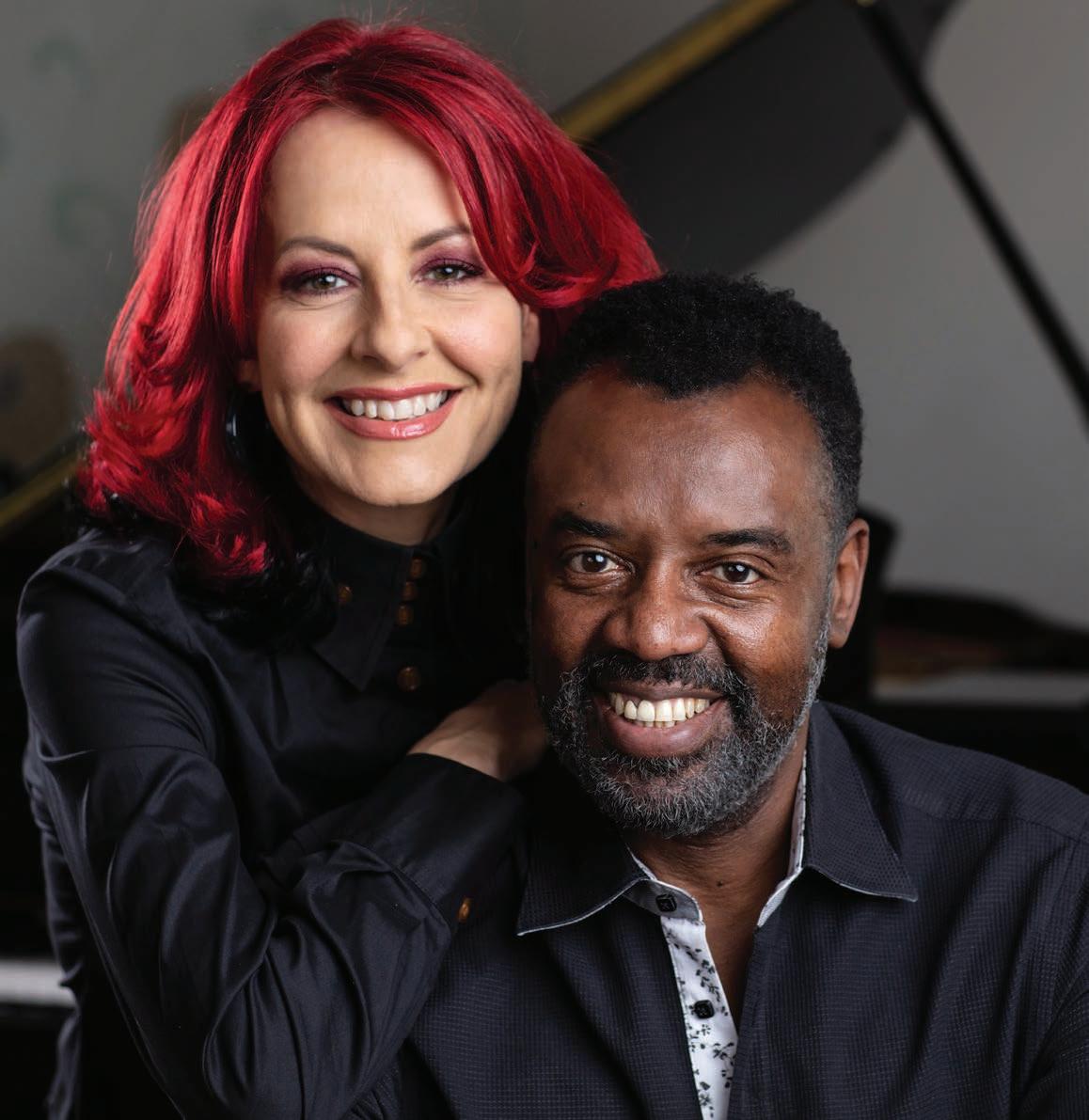

Taking action




Carrie Grant on how to bring about change – and what World Autism Acceptance Week means to her family

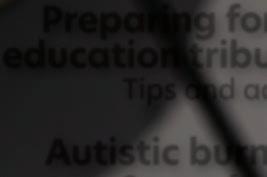
Preparing for an education tribunal


Tips and advice
Autistic burnout


Causes, feelings and recovery




Workplace Capability
Assessments, late diagnosis stories and podcasting pros
Plus
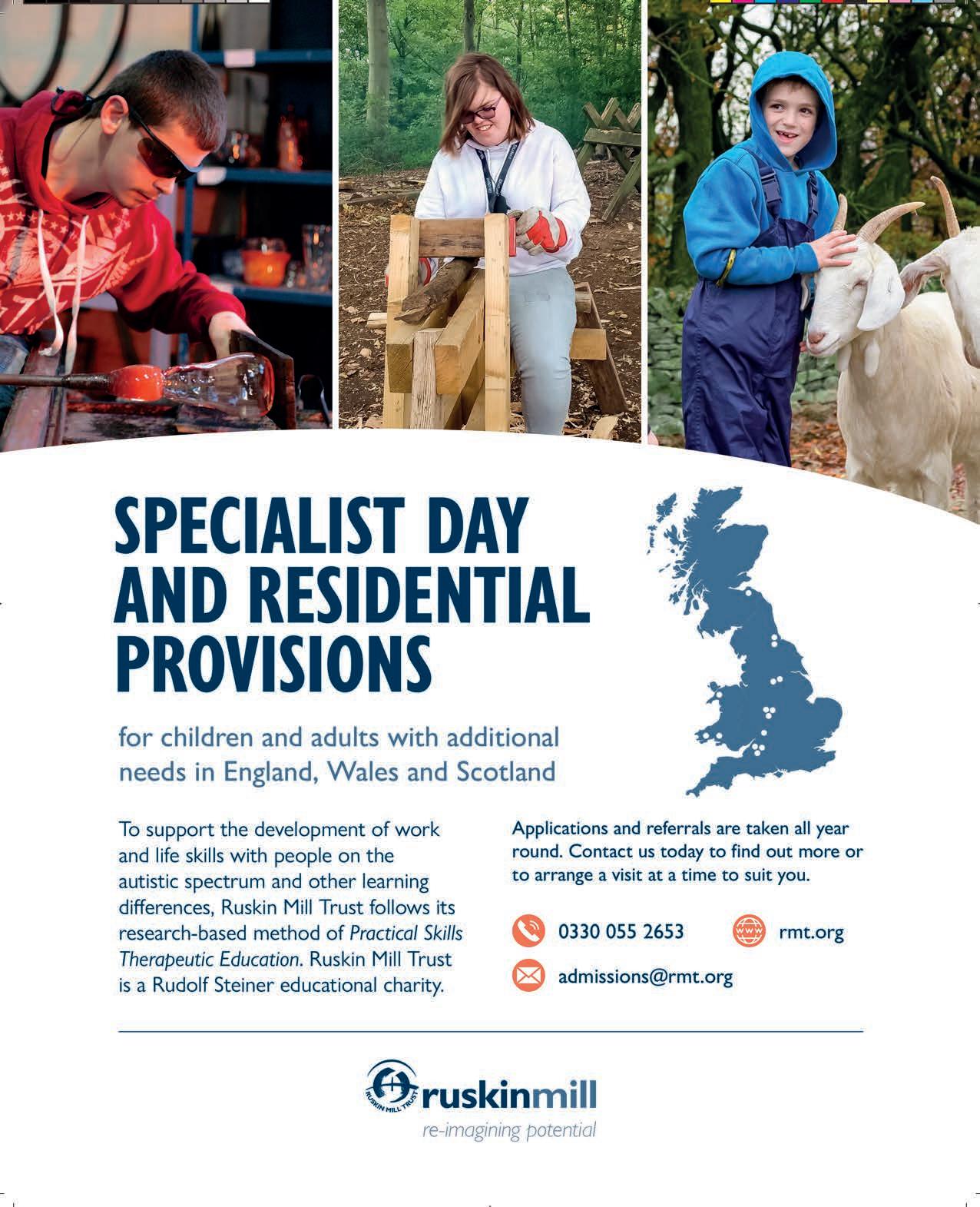

EDITOR
Suzanne Westbury
YourAutismMag@nas.org.uk
HEAD OFFICE
National Autistic Society Weston House 42 Curtain Road London EC2A 3NH autism.org.uk
SUPPORTER CARE TEAM 0808 800 1050 membership@nas.org.uk
ADVERTISING
James Pembroke Media Tel: 0203 859 7098
hoby.abdel@jamespembroke media.co.uk
SUBSCRIPTIONS
Only available to members of the National Autistic Society. To join, visit autism.org.uk
DESIGN AND PRODUCTION
CPL One 01223 378000 cplone.co.uk
1 Cambridge Technopark, Newmarket Road, Cambridge CB5
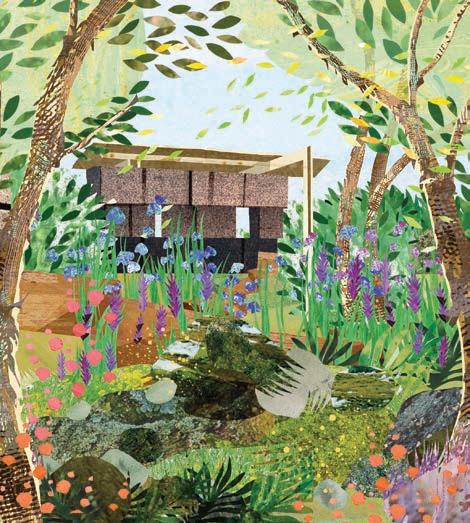


What’s new
A round-up of the latest news
News special
The Workplace Capability Assessment and the Buckland Review of Autism Employment
Our garden
Inside our charity’s garden at the RHS Chelsea Flower Show
World Autism Acceptance Week
Carrie Grant on the challenges families face
Meet the Trailrippers Mountain-biking brothers
My diagnosis
Garry’s positive discovery












Unlocking support
Abby’s recent diagnosis
Experiencing burnout
Kerise on the causes and recovery
Readers to the rescue
Paying for a private assessment
How to...
...help your child while they’re awaiting diagnosis
Appealing to an education tribunal
How to prepare
Notebook
Things to read, do and see
We’re... sports podcasters
Autistic school pupils tell all
“Just 29% of autistic adults are in some form of work”
Spring 2024 3
Contents
8PB PRINT Warners Midlands 01778 391000 National Autistic Society is a charity registered in England and Wales (269425) and in Scotland (SC039427) and a company limited by guarantee, registered in England (No.1205298), registered office Weston House, 42 Curtain Road, London, EC2A 3NH © Your Autism magazine Spring Vol 58, No 1 National Autistic Society ISSN 2055-0413 The views expressed in Your Autism and any enclosures or advertisements are not necessarily those of the National Autistic Society. In the interest of providing readers with the widest range of information, we may include details of some of the many approaches to autism. However, this does not imply our charity’s endorsement of any particular approach or product. The inclusion of a website does not necessarily imply that our charity endorses or supports the group or individuals running the website, nor does the absence of a website imply that our charity does not endorse or support the group or individual running the website. Spring 2024 YOUR 04 08 11 12 16 20 22 26 30 32 34 39 42 8 Thrill seekers Our Chelsea garden 11 16 Going to tribunal 34
Our round-up of the latest news and views
World Autism Acceptance Week
Our colourful World Autism Acceptance Week is back from 2-8 April! Come together to celebrate, fundraise and help us create a society that works for autistic people.
You can take part by doing a Spectrum Colour Walk wherever you are. It’s your walk, your way. This means you can choose your location, distance (we recommend 5km), and date and time to walk. After you register and raise £10, you’ll receive a pair of free no-tie shoelaces –kindly provided by our partner, Kicks Shoelaces – and a
National Autistic Society
T-shirt. After your walk, we’ll send you a well-earned medal and certificate! Find out more and sign up at waaw.autism. org.uk/do-your-own
Or you can fundraise your own way at home, school, work or with family and friends in your community. Game, bake, run, sing, dance –you can turn just about any activity into a fundraiser.
If you need a bit of inspiration, check out the great resources we have for you at waaw.autism.org.uk/ fundraise-your-way
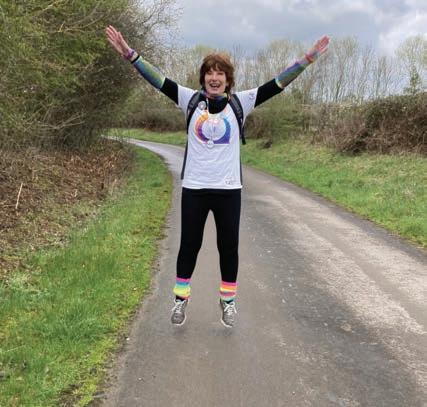
Last year, our member Lorna walked 70km to celebrate the week and her 70th birthday, raising an amazing £1,200
Free resources for autistic teenagers
Our new Know yourself series for autistic teenagers is now available on our website.
The series provides free online information for autistic teenagers to explore their identity, needs and preferences. There are downloadable booklets and online videos, all designed by and with autistic people.
The first two topics covered are understanding yourself and energy accounting. Understanding yourself includes exploring various elements of the autistic experience. Energy accounting is about a tool often used by autistic people to explore what takes away their personal energy and what increases it.
Rachel Townson, autistic adult and our Online Training and Development Manager, explains: “We have named these
resources the Know yourself series as autistic adults, and those diagnosed later in their life, often talk about wishing they had known their true self sooner.
“In my role, I am privileged to meet lots of autistic people. I recognise a lot of myself in their narratives and it seems to be common for us to constantly be piecing together our identity by understanding the wider autistic experience. So, when we were funded for this project, I knew it had to be something to support positive identity building at a young and crucial life stage.”
Connor Ward, autistic young adult and reviewer for the project, added: “I’m slightly jealous – I wish I had had these when I was growing up.”
The resources are free to use and available at autism.org.uk/KnowYourself
A guide to energy accounting Know yourself series National Autistic Society Energy accounting Energy accounting means working out what gives or takes away your energy The aim of this is to allow you to manage your energy by making sure you are not doing too many of the things that could lead you to becoming overwhelmed or exhausted. Everyone collects energy and ‘recharges their battery’ in different ways. There are many ways to do energy accounting, some might use colour- coded systems; others might use number rating systems If you are using one of these energy accounting systems, it is important to end your day with either a positive number or more green events than red. As you get older, having an occasional red or negative number day might be ok for you, as long as you build up your energy again as soon as possible. Things that give me energy: walks and nature quiet time alone listening to train and bus sounds being in an environment I feel comfortable in watching Netflix. Things that reduce my energy: being in noisy places switching between tasks masking smiling all the time and being nice being out of the house. 4 Your Autism
What’s new?
Get in touch!








Enhance your employability
We’re delighted to offer National Autistic Society members and their families and friends enhanced access to the IBM’s SkillsBuild programme. It provides a wide range of professional training courses at no cost and the chance to gain industry-recognised certificates to enhance employability. This extended version of IBM SkillsBuild also includes mentoring, and employability and inclusion programmes.
As well as technical courses – such as cybersecurity, data science, artificial intelligence, web development and green tech skills – there are courses available on a variety of subjects, including project management, problem solving, professional skills, leadership, career planning, mindfulness and many more.
Paris, who took a course in front-end web development, said: “I joined IBM SkillsBuild’s front-end web development programme on a whim – I’d never tried anything of the sort before. And yet it’s been a joy, and has given me a new passion – one that can easily become a career.
“I’ve gained skills, digital badges and professional certificates to go on my CV, and, thanks to fantastic career mentoring through IBM SkillsBuild, I was surprised to learn that the skills and achievements I’ve learned in just over 10 weeks will go a long way towards applying for entry-level jobs already. With that in mind, I’ve moved on to another course through IBM SkillsBuild to develop my skills and confidence even further. I’ve found a new passion, which I can take through into work that I’ll enjoy.”
Please enjoy access to the extended version of IBM SkillsBuild, available through our partnership, and register using our unique link ibm.biz/NASIBMSkillsBuild
Have your say in Scotland
The Scottish Government has published its public consultation on the Learning Disability, Autism and NeurodivergenceBill This means you can now have your say on what you would like to see included in the new legislation.
For several years, National Autistic Society Scotland has been calling for a commissioner for autistic people. We are delighted that the public consultation on the bill includes proposals for a commissioner or commission.
A commissioner would not only be a champion for autistic people, but would also hold local and national government and service providers to account, ensuring they uphold people’s rights and deliver the services they are supposed to.
In the UK, there has never been a proposal for legislation like this, with such a specific focus on upholding the rights of autistic people. This is an incredibly important moment and one that would see Scotland lead the way in real change.
Responses are due by 21 April – read the full consultation at consult.gov.scot/ mental-health-unit/learning-disabilitiesautism-neurodivergence-bill. You can sign up to our campaign for a commissioner at bit.ly/commissioner-campaign
Spring 2024 5
News
Our education event
The education system isn’t working for autistic children and young people. This is what we told MPs at our education event on 23 January.
As a result of our campaigners sending an incredible 6,643 invites, 46 MPs attended, along with other important stakeholders, and they heard directly from autistic students about their experiences.
We also explained how reform is desperately needed and gave recommendations on how to do this from our education report.
Read more at autism.org.uk/let-every-autistic-child-learn

Exploring experiences of older autistic people
Our research partner, University College London, has been busy working on its Audit 50 project – exploring experiences of older autistic people.
The first of its studies (bit.ly/assessingunderdiagnosis) suggests that substantially more – particularly older – autistic adults in England are undiagnosed, compared with children. This may be because of barriers to accessing diagnostic assessments.
The second study (bit.ly/life-expectancy-autisticpeople) found that autistic people are more likely to have a lower life expectancy than non-autistic people. On average, there was a six year difference for autistic people without a learning disability compared with the general population. More research is needed to explore why this is, and to focus on prevention. The research team is calling for better access to healthcare services and greater societal understanding of autism.
6 Your Autism News
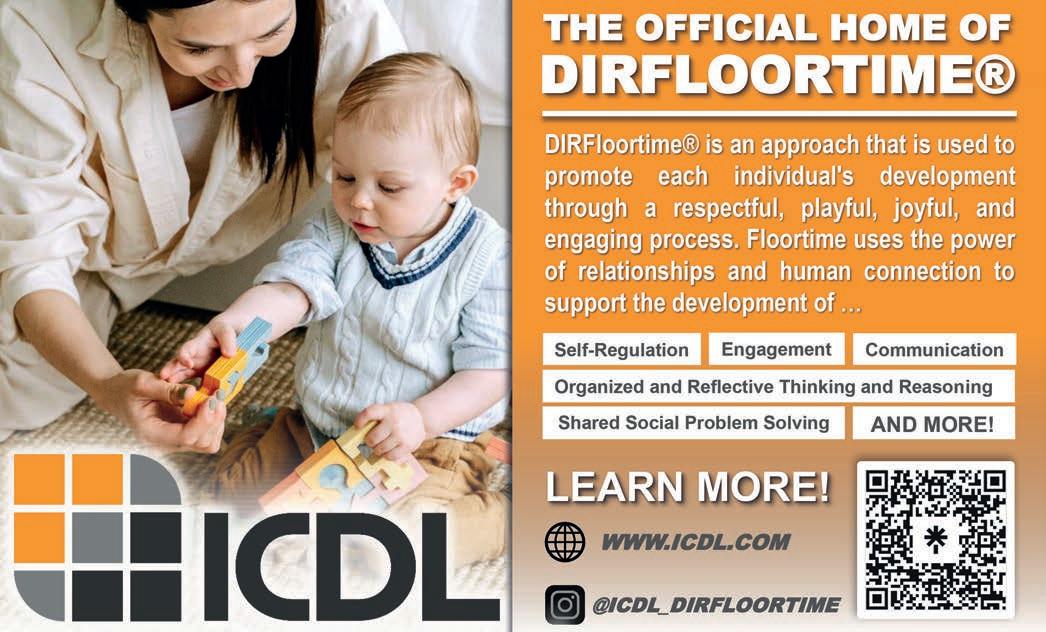

Changes to the Workplace Capability Assessment process
Jake Runacres, our charity’s Policy and Parliamentary Officer, updates you on proposed changes to the Workplace Capability Assessment and our response
In his Autumn Statement, the Chancellor announced that the Government would be altering the process by which people apply for benefits. Many autistic people apply for the higher rate of benefits associated with the Workplace Capability Assessment (WCA), as the workplace is poorly adapted to meet the needs of autistic people. Just 29% of autistic adults are in some form of work. This is the lowest employment rate for disabled adults and demonstrates the necessity of access to benefits.
The proposals would alter – or, in some cases, remove – the questions to which applicants respond. In most cases, the Government has taken the decision to make it more difficult to qualify for benefits under the different categories, such as getting about, coping with change and learning tasks.
Before making these changes, the Government held a consultation. We responded and shared the concerns of autistic people. In particular, we criticised a proposal to remove the ‘coping with social engagement’ descriptor. We are pleased the Government

listened to this recommendation, as this was a damaging proposal that would have deprived many autistic people of essential benefits.
However, the proposed changes will still make it harder for autistic people to access benefits. Over several months, we have heard how these proposals have caused severe stress and anxiety. The changes have the potential to have a significant impact on the mental health and livelihoods of autistic people already feeling the pressure of the cost-of-living crisis.
The Chancellor claimed a rise in flexible working was a new opportunity for disabled people to enter the workplace. While flexible working practices can help autistic people, there are not enough of these jobs available. Just 16% of working adults and 18% of disabled professionals work exclusively from home.
The Government needs to do more to create an employment system that works for autistic people. These plans will not do that and instead, simply add pressure on people who have been left without support for too long. We will carry on pressuring the Government to reverse these changes to the WCA.
8 Your Autism News special

Review calls on employers to boost support for autistic people
The Buckland Review sets out 19 recommendations to support more autistic people to start, stay and succeed in work. We take a closer look
The Government published the Buckland Review of Autism Employment on 28 February. Led by Sir Robert Buckland KC MP, the report focuses on supporting employers to recruit and retain autistic people and address the autism employment gap.
What does the report say?
The review highlights that the biggest barrier to accessing employment for autistic people is a lack of understanding and negative stereotypes.
Application and interview processes are rarely adapted to suit the needs of autistic people. Autistic jobseekers face barriers from vague job descriptions, ambiguous interview questions and sensory environments. Too often, the emphasis is placed on social skills rather than job skills.
Access to reasonable adjustments is inconsistent. In most cases, the onus is on the autistic employee to identify and advocate for adjustments. Around one-third of autistic employees felt unable to discuss their adjustment needs. Of those who did request adjustments, over a quarter were refused and
more than one in ten found the adjustment poorly implemented.
Recommendations
A key recommendation is the introduction of a taskforce to oversee the implementation of the review’s recommendations.
We were pleased to see this recommendation and hope that it will hold the Government to account on reducing the autism employment gap. Autistic people tell us that a lack of understanding and negative stereotypes are the biggest barriers to them entering and staying in work, so we welcome the recommendations in this report to create a national campaign to build employers’ awareness.
Other recommendations include:
● promote supported internships for autistic young people to develop work experience and skills
● work with autism charities to ensure autistic people know about Access to Work and the support it can provide
● work with autism charities to produce guides for a range of industries.
Our thoughts
This report rightly highlights that significant work is needed to ensure autistic people can get work that matches their abilities and meets their needs.
Autistic people have a huge amount to offer employers, and more businesses are now recognising the benefits of having a diverse workforce that is full of people who offer a variety of skills and different ways of thinking.
The Buckland Review is a step towards the change we need, but a radical transformation is necessary for autistic people to have the opportunities they deserve.
News special Spring 2024 9
Read the Buckland Review at bit.ly/Buckland-Review Access our free ‘Finding employment’ online course at autism.org.uk/findingemployment


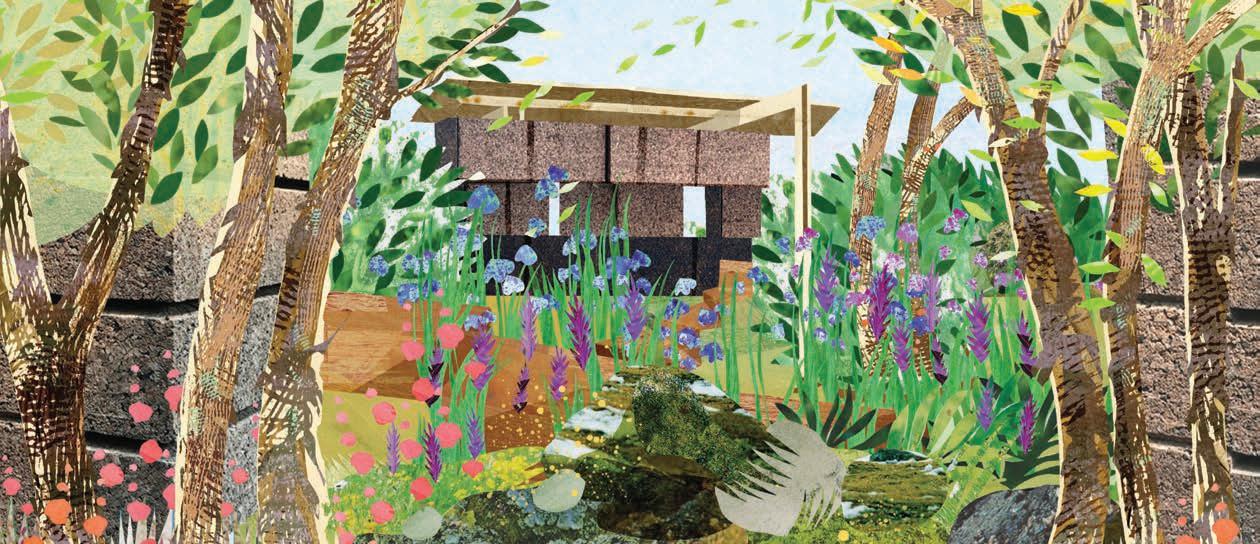
Our garden at RHS Chelsea Flower Show 2024
Our charity’s garden, themed around autism and masking, has been selected for the RHS Chelsea Flower Show, 21-25 May 2024
The garden will be created by co-designers Sophie Parmenter and Dido Milne (CSK Architects), and is sponsored by Project Giving Back, a charity that provides funding for ‘gardens for good causes’ at Chelsea. The RHS Chelsea Flower Show is one of the most famous gardening events in the world, having run for more than 100 years. After the show, the garden will be relocated to the site of our charity’s supported living service at Catrine Bank, alongside the River Ayr in Scotland.
About the garden
Our garden seeks to represent autistic masking and how autistic people experience this in different parts of their lives. Walls or ‘masks’ of timber and cork create a series of spaces dedicated to different types of social interaction. There is a large, covered space for family or friends, an intimate corner for a quiet conversation with a partner or for sitting by yourself and a more formal space for colleagues. A mesmerising kinetic sculpture alludes to the mind’s beauty and complexity. These three outer spaces surround the heart

of the garden, a sheltered and mossy dell that embodies the space of the inner mind.
The theme: masking
Masking is a strategy used by some autistic people, consciously or unconsciously, to appear non-autistic in order to fit in. However, masking can come at a great cost because it relies on suppressing natural behaviours, instincts, needs, preferences and coping mechanisms, which can result in exhaustion, mental health difficulties, a loss of sense of self and low selfesteem. It is important for society to become more accepting of autistic ways of being so that the pressure to mask is reduced.
Five key plants:
● Myrica gale: bog myrtle/sweetgale
● Betula nigra: river birch
● Molinia caerulea subsp. arundinacea
‘Karl Foerster’: native purple moor grass
● Meconopsis ‘Lingholm’: blue poppies
● Cephalotaxus harringtonia ‘Fastigiata’: Japanese plum yew
Find out more about these, and see a full plant list, at autism.org.uk/garden
News Spring 2024 11
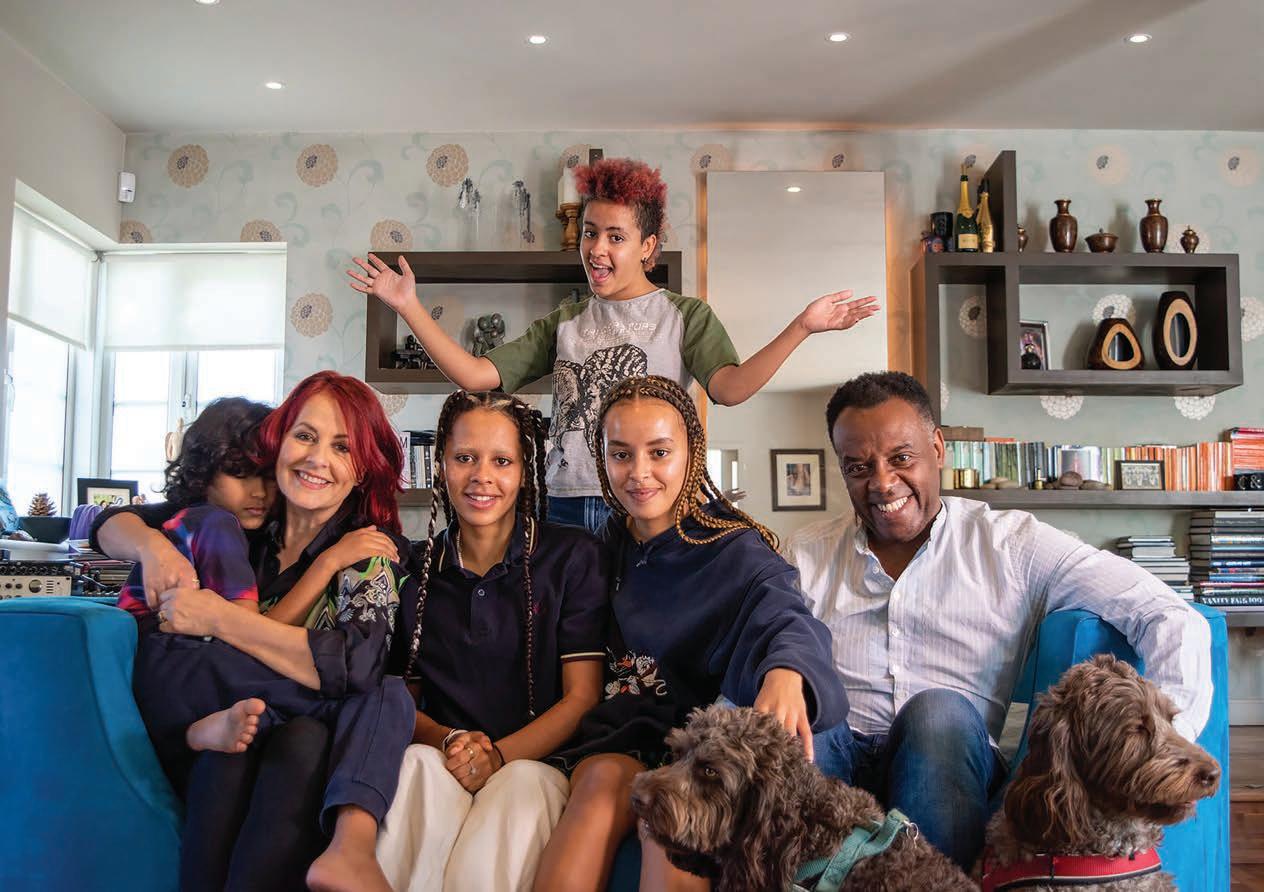
“World Autism Acceptance Week has never been more important”
Vocal coach and our ambassador Carrie Grant writes about the huge challenges families continue to face in accessing mental health services and getting the right education, and how to bring about change
Neurodivergence is now a hot topic on social media. Many more people are being diagnosed as autistic, and we have a more helpful and positive narrative emerging.
However, that is not the full story. On the ground, many in our community and their families face daily challenges to be seen, heard and understood.
As I write this, a viral social media post has been released showing
three councillors from Warwickshire County Council. The professionals are talking about SEND children and their parents, displaying terrible ignorance.
In my opinion, World Autism Acceptance Week has never been more important. We must continue to show the many faces and lives of autistic people, giving voice to our community in the face of great othering.
Campaigning 12 Your Autism
For many parents, one of the biggest challenges is trying to access services, particularly mental health services. Five years ago, only 25% of those referred to Child and Adolescent Mental Health Services (CAMHS) were able to gain access to the service. A report from February 2024 showed CAMHS referrals were up by 52%. So, my question is this: When so much is being said about the struggle to get our children’s mental health sorted, would it not also be wise to reflect on what might be breaking them in the first place? Our children are traumatised.
Within education, we can negotiate reasonable adjustments, try for an EHCP, work out how to collaborate with the SENDCo to help our children get through school, but somewhere along the line, we have to look at systemic change.
Teachers have unbearable pressure upon them, children are suffering, and yet, we live in a society clinging to an outdated model of education, which is not fit for purpose. If we were to redefine the primary themes of education as encouraging curiosity, creativity and community rather than simply passing exams, we would be creating lifelong learners who are prepared for a world in which they can take their place.
Educational achievement is not a destination, it is the beginning of a journey of developing and growing. In our family, we encourage growth through process, exploration and taking time to work stuff out. It’s not a race – we are working toward wholeness, purpose, finding our people and working out who we are and where we belong.
In mainstream school, none of my children ever belonged. The
opposite of belonging is trying to fit in, and that’s what my children tried their hardest to do. It led to eating disorders, self-harm, violence, struggling with attendance and suicidal ideation. It led to permanent exclusions and children being out of school for years. Their educational experiences have meant they will be working through trauma for much of their adult life. When masking is seen as an achievement and not a problem, this will always be an issue.
As parents, we can also get caught up in the pursuit of ‘normal’, relieved when our children are passing as neurotypical. It’s wonderful when any autistic person feels they are able to take their place in the world, but if the world does not understand that person, we should be mindful in asking: “At what cost?”
In our family, the biggest challenges we have faced outside of the home have been twofold: attempting to collaborate with uninformed schools and trying to access CAMHS. In schools, there are three types of professionals you will meet: those who get it, those who don’t get it but want to learn, and
“It’s wonderful when any autistic person is able to take their place in the world, but if the world does not understand them, we should be asking: ‘At what cost?’”
those who think they know everything about SEND but don’t. It is this last group we found impossible to collaborate with. Eventually, it became my one aim to find the rule-breaker, the teacher who would say, “We don’t normally do this… but…” These were the people with whom we could collaborate and achieve meaningful change for our children. And as for CAMHS, one of our children was in hospital for the second time with suicidal ideation by the time we received CAMHS help. I have to say, in our case, it was great once they got it, but so much pain could have been
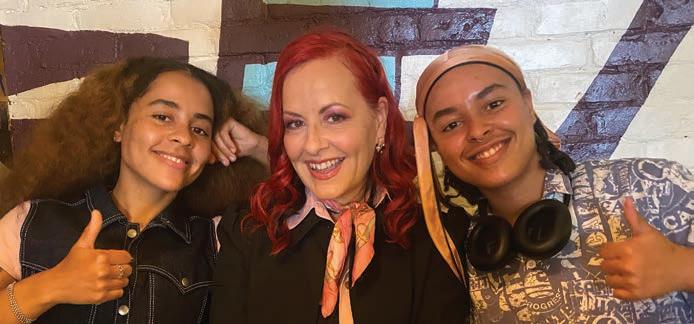
Spring 2024 13 Campaigning
Carrie, pictured middle, with members of her family
avoided if parents and education and health professionals had worked together with our child from an early age.
One of our children was out of school for three years and is now in an amazing autism school. It’s now seen as a success story, but in reality, nothing will win back those pivotal lost years. When a child has no school, the message this sends to the child is that they are not good enough, they will never have friends, they are rejects and will never be able to fit in the world.
Last year, when I received my own autism diagnosis (yay!), the most powerful words the psychiatrist said to me were: “You have created the environment in which you most thrive.”
This is what we must all work towards, creating environments where our children and families can thrive. Ultimately, I believe this should be done in integrated ways. Having community and making community gives meaning to our lives. Even for those of us who do not want to interact much, it’s important to know that if we do, things will be okay.
Creating environments
Over the years, I have had the privilege of being part of many initiatives to bring about change. For many years, I focused on calling for more diagnosis of autism in women and those assigned female at birth, and we have seen massive changes in this area. I have written books and chapters in books, but my greatest love has been the
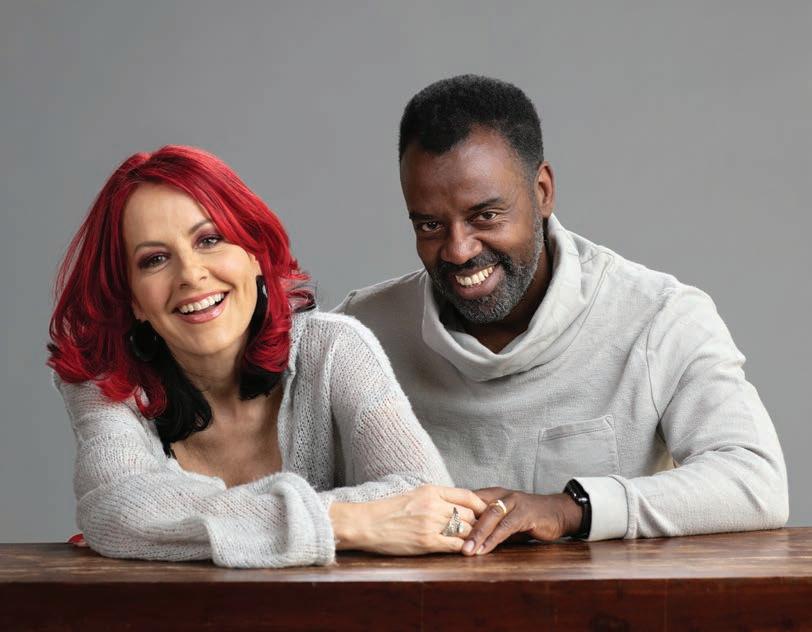
support group we started in our home 11 years ago.
The families we share with have become our extended family; sometimes, nothing needs to be said, we just get it, and that means the world to us. I would thoroughly recommend finding others who face the same challenges as you and gathering together, sharing stories. We all need a place where we can share without having to explain, and being with others who are on the same road really helps.
If I were to look forward and think about what a better future might look like for autistic people and their families, I would want to see our children walking through arches where there were once doors blocking their way. I would want a redefinition of what ‘normal’ is.
A very modern family: Stories and guidance to nurture your relationships by Carrie and David Grant is out now.
I would want all the multi-hyphenate intersections within our community to be understood, and our people to be seen, heard and celebrated.
Like Carrie says, World Autism Acceptance Week has never been more important.
Every step taken and every £1 raised by our supporters brings us closer to a society that works for autistic people. If you can take on a Spectrum Colour Walk or any other fundraising activity for us this April, we would love to welcome you to the team!
Visit waaw.autism.org.uk to find out more.
14 Your Autism Interview
Campaigning
Carrie and husband David
© Sophie Mutevelian



Meet the Trailrippers
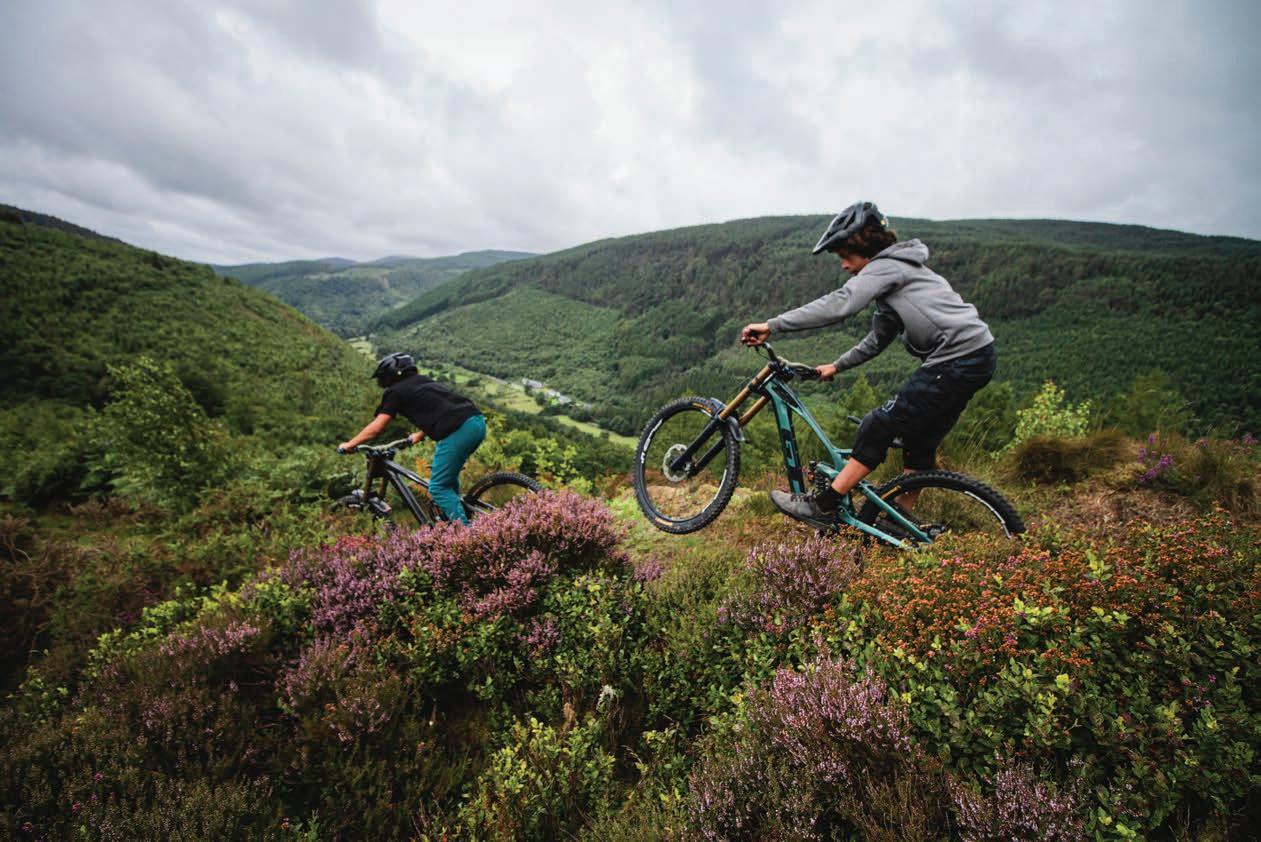
Mountain-biking brothers Nathan and Ruben are both autistic. We talk to their mother, Ina, about how the sport helps them to regulate, and discuss their new short film, Flow
When were Nathan and Ruben diagnosed?
I noticed things were different for Ruben when he was 18 months old. He had really repetitive behaviours, such as a bedtime routine where every step had to be followed to the letter. And he had huge anxiety around water. He was terrified of water coming from above, so rain would send him screaming. We started the diagnostic process when he was three. It was quite a waiting list, and he was finally diagnosed in 2015.
Nathan is different because he’s got a mix of things going on. He had 16 Your Autism
some serious mental health issues in 2019 and was diagnosed as autistic in 2022. Initially, it was autism with strong demand-avoidance traits. Six months later, he had his ADHD assessment and ticked every box.
How did the boys get into mountain biking?
By the time Ruben was four, he seemed to connect very well with dogs. We got to know a large German shepherd, which Ruben absolutely loved. This led to us adopting a German shepherd in 2016. Our dog obviously needed a walk every day. But the boys hated
walking, so they brought their bikes along. They just had normal kids’ bikes, but if there was a log on the path, they would jump over it and whizz through the woods. They’d ride down steep sections and loved it. Now we understand how Nathan’s ADHD contributed to that, but he always wanted to go a bit further, to do something a bit more extreme. We went on holiday to Wales, and I asked a trail centre for a coaching session so Nathan could bike more safely. When the coach took Nathan around, he couldn’t believe how skilled he already was on the £25 bike we got from Gumtree. I also did
Experiences
© Nils Bussink
a loop with Ruben, who was on a heavy steel bike. And, again, how Ruben was able to do that aged five was pretty impressive.
With me being a single-parent carer and on a very low income, the only way to get coaching was to enter races. Before each race, they offered children free coaching sessions. Ruben actually refused to do the first race because it was on a grass hill. He said: “This is not mountain biking; it’s not a mountain.” Our whole story has little bits like that! But because of them being autistic, they had that passion, that obsession, and were happy doing things over and over to improve their skills.
You’ve written about the boys being in a ‘flow state’ when they’re biking. What does that mean?
The boys didn’t know that flow state was a researched concept until I introduced it to them last year. But they experience a flow state very regularly. When Nathan was eight, he said: “When I’m on my bike, I feel alive and everything else disappears.” It’s just them and the track and their bike out in nature, and they are so much in the moment that everything else is irrelevant. Which, again, brings massive advantages for a neurodivergent person because life generally has lots of ups and downs, and being able to experience that flow state is therapeutic.
How does mountain biking help them to regulate in terms of emotions?
Being in that flow state helps the heightened cortisol and stress levels. It brings them down to a level where it becomes more manageable, and
then it’s easier to go through things a bit more rationally. Usually, if they get on their bikes when they’re a bit dysregulated, they’ll come back a lot calmer, just from having been in that state and so focused on what they’re doing.
Nathan also builds trails and digs tracks, with the repetitive motion of shovelling dirt and patting it down helping him a lot. But it’s also the physical action. Just being physically active and being out in nature is beneficial. That feel-good feeling, all the happy hormones are there, and it makes life a bit easier.
What challenges do they face?
Race events are attended by 200300 riders and are busy. They’re usually in the UK, so very wet. So you’re dealing with the whole
“I’m excited for every ride because it’s always different and a fun experience” Ruben

MacFarlane
Spring 2024 17
© Lorne
Experiences

“When I ride my bike, I am just so much in the zone and in flow, and I love the feeling of going fast”
Nathan
sensory side of being wet and having to take off muddy stuff afterwards and wash bikes. There are a lot of demands on them. We need to make sure they have downtime. We’ve rebuilt a school bus as a race van, so they’ve got their own little space they can retreat to. They have headphones on and zone out on their screens to reset the nervous system.
What’s the response to Flow been like?
It’s been amazing. Flow won the People’s Choice Award at Kendal Mountain Festival. It was Best Short Film in Fort William Mountain Festival. We’ve been selected to be screened at the bike night at Vancouver Mountain Film Festival in Canada – and it’s got more than 20,000 views on YouTube now.
We’ve had lots of feedback from autistic people and families. That was the whole reason we wanted to
tell this story, because we know there are a lot more neurodivergent people within mountain biking, but nobody was really saying much about it. It’s nice that it’s resonated with a lot of people and has encouraged people that, yes, you’ve got a disability, but that doesn’t mean life becomes of less value. It’s a different ability, and we see neurodivergence as a power that comes at a cost.
Personally, I have a difficulty with putting disabled people who are high achievers on a pedestal and celebrating. For some people, making it to a hospital appointment,
being able to get into that hospital and having whatever procedures are needed, is just as big an achievement as it is for my boys to get down a hill really fast. But that will not be seen by most people as inspirational because they have no understanding of the struggles of a disabled person, whereas our story is seen as inspirational, and I kind of want to push against that. Yes, we wanted to tell our story, but it was more to show an honest account of what it is to be autistic.
Autism has many faces, and a lot of people who get diagnosed later won’t have previously realised that not everybody is a Rain Man or has profound learning difficulties. It takes so many different forms. This is what it looks like for Nathan and Ruben.
If you are feeling inspired by Nathan and Ruben and would like to take on a cycling challenge, check out our fundraising events at autism.org.uk/ fundraising-events
18 Your Autism
Watch Flow at youtube.com/watch?v=Z1RDSvDXeo
Digital Downhill Experiences
©

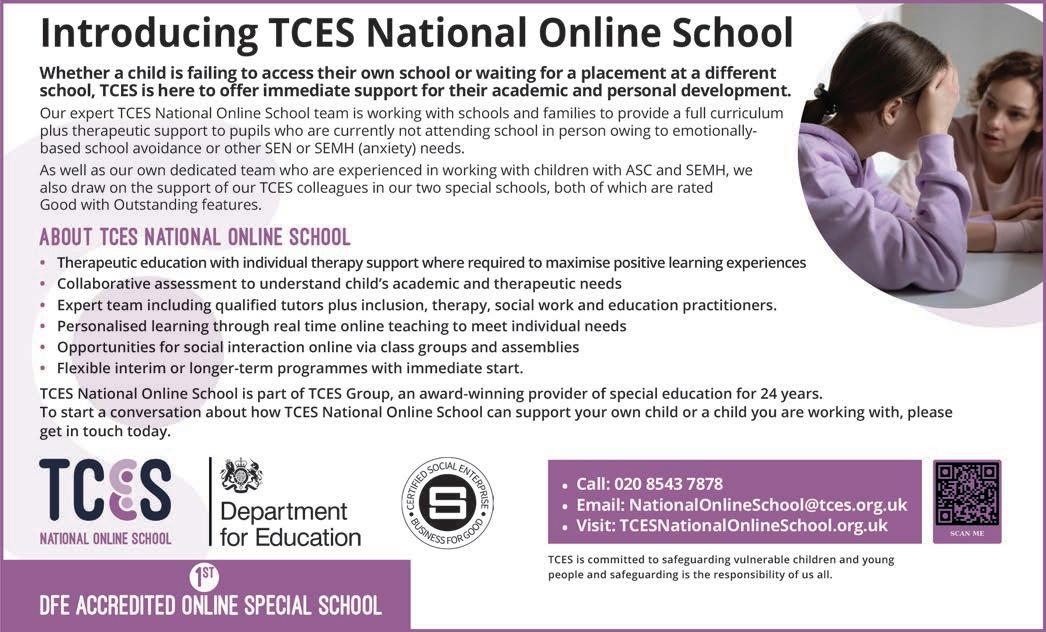
“A late diagnosis can be an opportunity”
Garry was diagnosed in 2013, when he was 50. He shares the positive impact it has had on his life
From early childhood, I was always different. At primary school, I was slow to learn, and my first report noted I was an ‘introverted extrovert’. From age eight, I developed multiple chronic tics that I still have. My childhood games with toy cars always comprised rank orders and divisions based upon various performance and collision tests. I had an encyclopaedic fact memory and some unusual talents, such as an ability to speak words backwards.
A sudden late development resulted in me passing my 11+ exam and attending grammar school. From year nine, however,

I lost my way, and my grades declined rapidly. If I didn’t like a subject, I simply lost all interest. I had other distracting obsessions, such as progressive rock music, which I would listen to for hours, and I collected more than 100 albums with my pocket money.
I was also an athlete, winning various county championships in middle-distance and cross-country running. However, this felt less of a passion than a burden. I just happened to be good, but hated competing because of extreme nerves that made me sick before a race. As it happened, my brief athletic career declined when, one weekend, I chose to run for my athletics club rather than the school. My PE teacher got me banned from running for the school or county. This left me with a huge sense of injustice, which was very much an autistic trait of my character.
A prime example of this was getting sacked from a summer job in a supermarket when I was 17. I challenged the area manager with a whole page of reasons why he was wrong. He challenged me to a test on knowing the prices, as none were marked on the products to save costs. That evening, I memorised all 700 prices in a few hours. The next morning, I was tested and scored 699 out of 700! The one I got wrong was only by half a penny. I got my job back and bought a motorbike, which became my next obsession.
After poor A levels, I had numerous shortterm jobs, including stints as a motorcycle courier. Things only stabilised after my sudden conversion from agnosticism to Christianity. For me, everything was either
My diagnosis 20 Your Autism
Garry represented England after taking up running again
black or white, and I had now flipped from one worldview to another.
My Christian faith and church family gave me a new sense of stability, however, and enabled me to stick with one job.
I was able to save money to go to a bible college for a short course. There, I met and married my wife, Carol, which brought new responsibilities.
What led to my diagnosis
It was Carol who first noted similarities between myself and some autistic children that we looked after as foster carers when I was already in my late-40s. I decided to see my GP to make enquiries, but was not taken seriously until I booked a second appointment. From there, the assessment, including waiting for appointments, took two and a half years.
The letter for my final diagnostic interview requested the presence of my parents to ask them questions about childhood. My parents were in their 80s! Nonetheless, they willingly came along, giving good insight. Following this, it took me another 18 months to accept the diagnosis. However, I did start to question whether autism could explain my lack of career fulfilment and struggles with depression, anxiety and frustration.
Life afterwards
With some talking therapy and medication improving my mental health, I considered further education. After attending a taster day at Anglia Ruskin University (ARU), I gained a place to study paramedic science at the age of 52.
Despite many difficulties, I made progress, mostly by sheer determination. In the second and third years, I made full use of the mentoring support available to me as a disabled student at ARU. In 2018, I graduated with first-class honours and started my career as a paramedic. Five years on, and now aged 60, I am not only a paramedic but also a lecturer/practitioner in paramedic science at ARU. In January 2024,
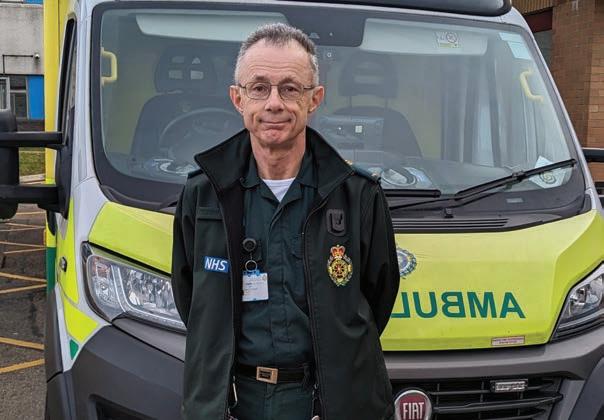
I completed my Master’s degree in medical and healthcare education, achieving a distinction. A more unexpected development has been the opportunity to redeem the potential that I missed as a schoolboy athlete. Having started running in late 2020 to enhance my recovery from a rare form of pneumonia, I did not intend to compete. However, I then discovered age grading and began to set myself targets, which became another obsession.
I got a late place for the London Marathon in October 2022, and I ran a good age time and qualified for London 2023. I then entered the English Masters race as part of the Chester Marathon in October 2023. To my amazement, I came second in England and third in GB, and gained selection to represent England at the International Representative Masters Marathon in Chester 2024.
I still struggle with my mental health, social skills and obsessions. However, I hope my story will encourage readers that a late diagnosis of autism can be an opportunity to reclaim any dream you had given up as lost. It’s never too late!
For advice about mental health, visit autism.org.uk/mental-health
My diagnosis Spring 2024 21
Paramedic Garry also lectures at Anglia Ruskin University
Unlocking support
Lisa writes about her 23-year-old daughter Abby, who only recently got her autism and ADHD diagnoses
We’ve known Abby was autistic since she was in primary school. I’m an occupational therapist; I spotted the signs where others had her pegged as precocious. Her social interactions and communication were different from other children. She was routine-driven, had oversensitive reactions to taste and touch, and intense interests – Harry Potter and figure skating! But, to us, she was just Abby… creative,

intelligent, funny, loyal, loving, adventurous, fearless, imaginative, determined, energetic, persistent and charismatic.
Abby excelled academically and athletically. Aged eight, she was on the GB figure-skating development squad and began to represent her country internationally.
Life was great… Abby wasn’t concerned; we weren’t concerned; school wasn’t concerned. We all assumed her neurodivergence would work in her favour as she transitioned from child to adult, to the extent that her school dissuaded us from pursuing an autism diagnosis when she was 13.
At the time, we remember thinking being neurodivergent did no harm to Einstein, Darwin, Da Vinci, Van Gogh, Edison, Ford and Gates. They had all used their unique strengths to accomplish amazing things. We all expected having a high IQ would make life easy for her; her strengths and talents would take her far.
Going into adulthood
Life for Abby changed around the age of 16, however. Cue a figure-skating injury and being unable to train. Cue the change in learning style from GCSE to A level. Cue the growing expectations of society as young people develop independence and become adults.
Who, outside of medical and psychological circles, has heard of executive functioning and its development by age? I assumed that was just part of growing up. The ability to plan, manage time, initiate tasks, organise, solve problems, be flexible, control your emotions, impulses and attention, and self-monitor.
As parents, we don’t think about teaching these skills. They’re part of day-to-day learning and develop naturally in a neurotypical brain, and I had no idea of their impact on the neuroatypical brain. We don’t think about these things; we take them for granted, and they’re vital to function as an adult. You don’t know you have them until you know someone who hasn’t.
As Abby approached university applications, it was becoming obvious she wasn’t going to be able to cope. Not academically, but being able to get up on time, pack her bag, get to
22 Your Autism
Real stories
Abby and mum Lisa
"I went for 18 years without a single diagnosis. Since then, I’ve been collecting them almost as quickly as I collect books, or Funkos, or any of the other million things I obsessively collect. Only two are truly important: autism and ADHD. People react in so many ways, but for me, I feel pride. I’m proud to be different and to have a unique brain. It makes me who I am, it’s a fundamental part of me and always has been, diagnosis or no. I wouldn’t give up my mismatched neurodivergent brain for anything. It’s undoubtedly what I love most about myself, because it’s me."
university, find her class, remember to eat, focus on what needed doing and so on.
The school had already failed her, and then so did the NHS. When we approached the GP for support, we were told there was a waiting list for assessment of more than two years. Are you kidding? This is time-critical stuff!
How lucky we were to have been able to pay privately to see a psychiatrist and obtain that necessary diagnosis to validate her feelings and experiences, and to unlock the support she needed to navigate her way through university. We were finally winning… or so we thought.
Continuing struggles
Despite all the ‘right’ support as an autistic student, university continued to be a challenge. The academic demands grew in speed and complexity. Abby was unable to graduate in 2023; however, thanks to an amazing disability service (go you, University of Sheffield), she has been given a lifeline to 2024.

Our story Spring 2024 23
Real stories
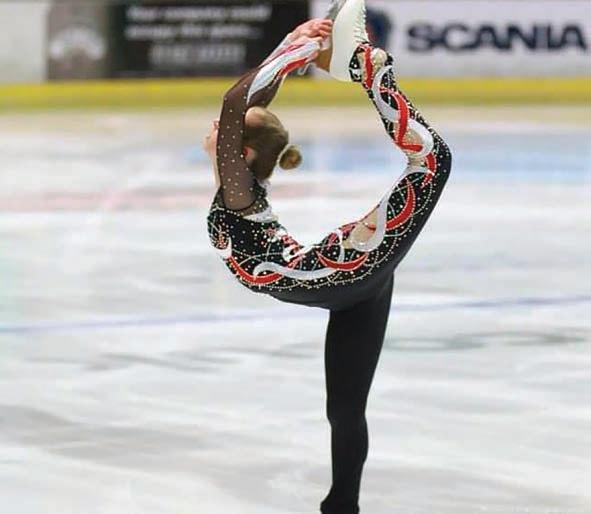
Abby was celebrated as smart and as an excellent athlete as a child. It was the foundation of her identity and the source of her self-esteem; she carried the expectation of success. Struggling, when she previously thrived with little effort, had a huge impact on her and us. We were baffled and queried ourselves constantly. Did she really want to complete her degree? We offered her support to choose an alternative path, but she was determined, and we didn’t know how to help any more.
We contacted the GP again, only to be told this time that there was a three-year wait to see a psychiatrist. Yes, THREE! Are the powers that be determined to assign these young, creative, skilled individuals to the waste heap? It seems so.
A dual diagnosis… at last
How lucky we were to again have the funds to pay to see a private psychiatrist. In October 2023, Abby was diagnosed as having a combined presentation of ADHD.
We began to remember Abby as a child. She had such a short attention span, couldn’t wait her turn and she was full of beans at 6am at the ice rink when everyone else was bleary-eyed.
Thinking of Abby now… she has difficulty paying attention and focusing, easily gets distracted, zones out, daydreams, struggles to complete a task, has poor listening skills, lacks
attention to detail. Those who know us may think Abby seems to function well. Or they may think we do too much for her as parents. The answer is yes, she appears to, and yes, we do. But this has come at a high emotional cost for all of us. No wonder life seems overwhelming to her, and no wonder we are still providing support that our friends stopped giving to their children many years ago. Without us, Abby’s racing brain, darting mind, disorganisation, lack of focus, procrastination, forgetfulness and impulsivity would run wild, and she would probably still be in bed. Not being lazy, not even enjoying her time there… but struggling with fatigue, poor self-esteem and a negative self-image.
But, finally, we’ve arrived at this point. Yaaaay! Will it be the answer? Who knows. We hope so. We want it to work for Abby so she can achieve the potential that has been locked up for too long; we want it to work for us to relieve the worry about what the future holds; we want it to work for society to enable you all to benefit from what she has to offer.
However, she was Abby yesterday; she is Abby today. She’s awesome, and we’re proud of her. All we want for our children is happiness, but this is a complex subject in neurodivergent people. Giving up is not an option for Abby; she has dreams, and she wants to realise them. She deserves to realise them.

NHS data shows a staggering 157,809 people were waiting for an autism assessment in September 2023. Join our campaign to bring waiting lists down at autism.org.uk/campaign
24 Your Autism
Real stories
Abby represented GB at figure skating
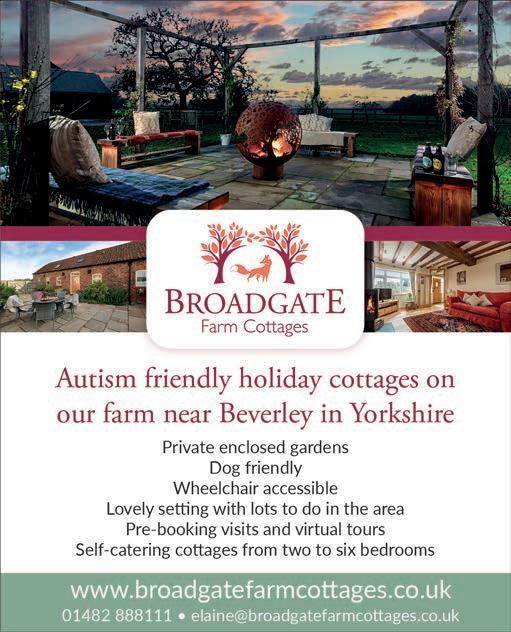

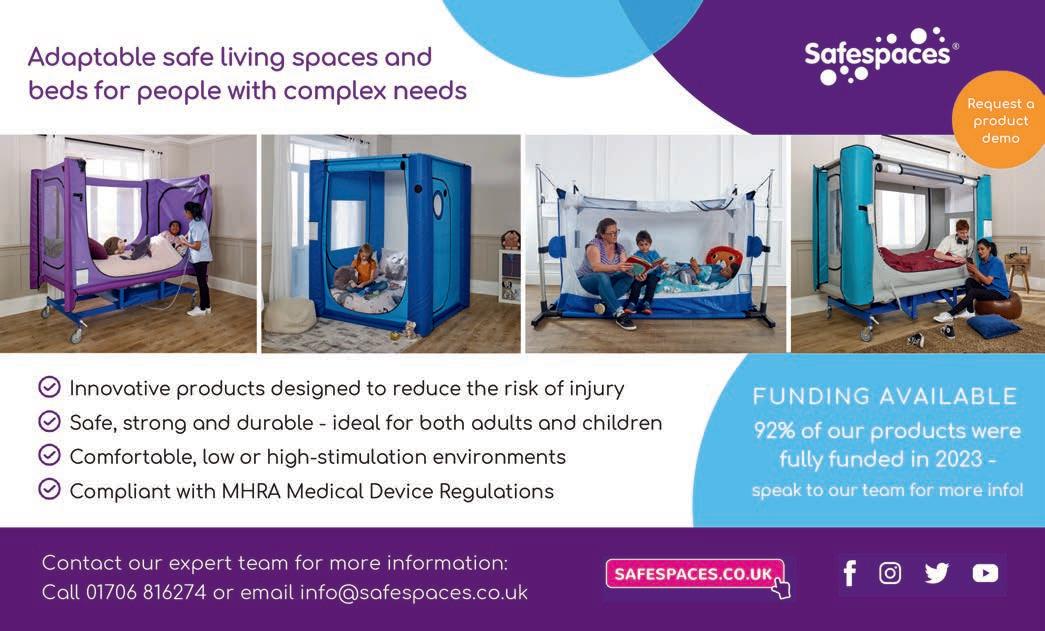
Experiencing burnout
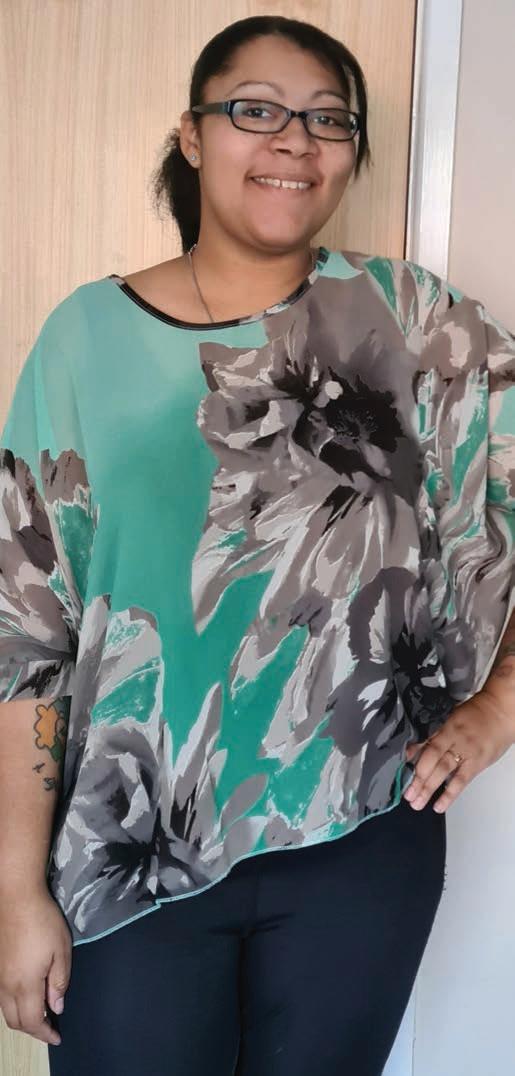
Kerise shares her experience of autistic burnout and how she recovered
I began to experience autistic burnout after taking on many more daily activities than I would usually. I was constantly juggling with trying to find ways to earn an income online, home-educate my son and deal with long-term housing issues, as well as care for my husband and son, who are both autistic too. I subconsciously neglected my own needs and felt the stressors build over the level I could bear.
The feelings I experienced in burnout were mental exhaustion, excessive anxiety and panic. I would sleep for hours but feel tired upon waking. My driving skills suffered, to the point that I was scared to get back on the road. My sensory sensitivities increased, with my sense of smell and hearing worsening, and I was having a lot more meltdowns.
Burnout caused by masking
Although everything at home added to my stress, this wasn’t directly the cause of my burnout. Instead, these stressors were only adding to what had already been there for quite some time.
I truly believe the cause of my burnout was because I was masking my autistic traits for many years, with no realisation for the first 28 years of my life.
In May 2019, I was diagnosed as autistic. From then onwards, however, I experienced intermittent imposter syndrome, where I couldn’t fully accept my diagnosis or even internalise this new aspect of my identity.
So, even after my diagnosis, I decided to keep masking many of my autistic traits to fit into a neurotypical society. I continued down this road because it was the only way I knew,
26 Your Autism
Real stories
Kerise: “Forget what others think... and be you”
Autistic burnout
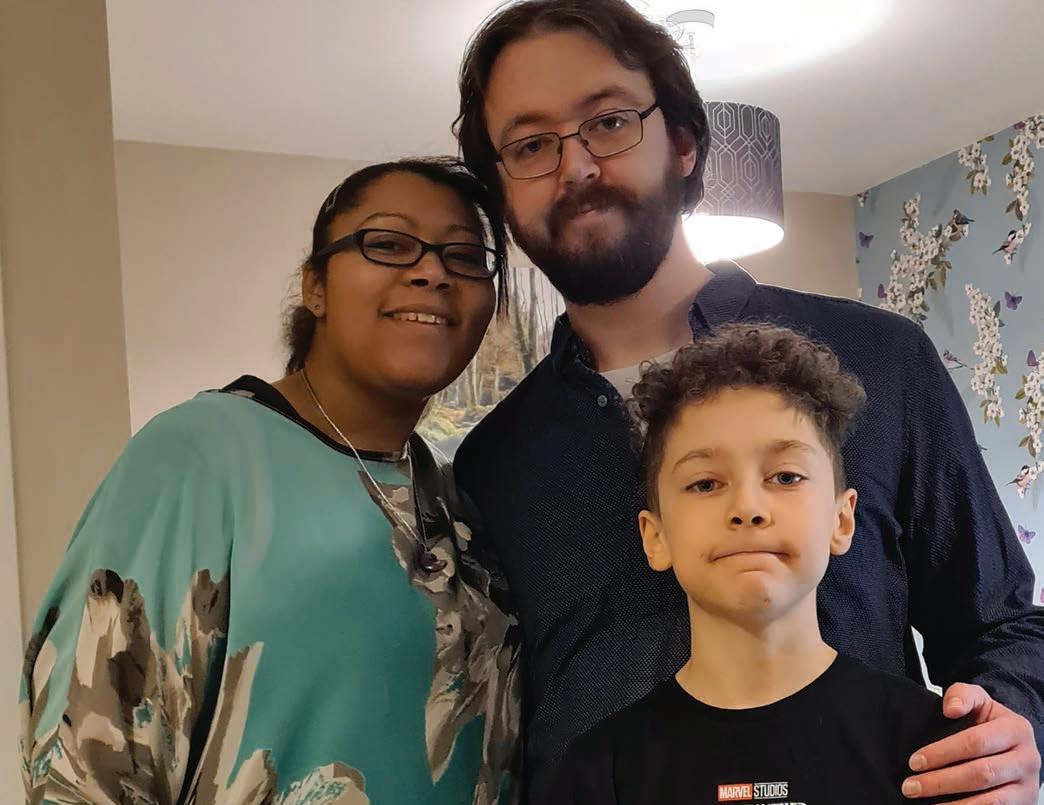
Fatigue – and, subsequently, burnout – can happen to anybody. Autistic people, however, can be more susceptible to both because of the pressures of everyday life, having to navigate social situations, masking and sensory overload.
Trying to cope with these pressures can lead to exhaustion (autistic fatigue) and, over time, this can lead to extreme exhaustion or autistic burnout.
and I felt I couldn’t act any other way. I thought if I began to show my whole self to the world, or even around my friends, they would think I had changed or wouldn’t recognise who they used to see.
I was completely comfortable to stim at home, privately, which involved me rocking back and forth or side to side, spinning around, or fiddling repeatedly with my hair or fidget toys. But, in public, I felt I couldn’t do any of this,
which resulted in me discreetly skin picking, which I have done for years since I was a teenager.
My burnout happened in 2023 because of the constant masking during the overload of stressors in my life that I kept to myself. I was masking all my traits of needing to stim and continued to play pretend. I didn’t think to just stop, look and acknowledge what I was doing, slow it down and ask for some support from a loved one.
I’ve always been the stubborn type who needs to be quite independent, but I knew this had to change for me to feel better. By autumn 2023, my burnout symptoms began to show externally, and relatives and friends
Spring 2024 27
OurRealstorystories
“I would sleep for hours but feel tired upon waking”



noticed I wasn’t doing as well as I could. I explained to them what I was going through and shared, briefly, what autistic burnout was and what I needed to do to get myself better. They were very supportive, thankfully.
How I recovered
It took just over two months to recover fully. I stopped most of my activities and let my husband, support worker and my mum help with things I felt would slow down my recovery progress and that I knew had always been a trigger for me. I got myself some more fidget toys, listened to music I love, watched movies that I love, sometimes on repeat. I bought more sensory items, including sensory lights and plushies, and finally got a pair of noisecancelling headphones. I was always afraid to wear those in public, in case others thought I was changing dramatically.
At that point, with how I was feeling, I didn’t care any more – I was just interested in getting myself fully recovered and learning to unmask so I could be my true self and rest when I needed to.
I have now fully recovered, thanks to the self-care, acceptance and awareness that I chose for myself. Unmasking my autistic traits slowly made me feel so much more alive and well. I’ve hardly had any meltdowns, I’m not constantly exhausted and I feel like I can be the real me, something I felt I couldn’t be before!




My advice to others experiencing autistic burnout is to listen to your body – to how you truly feel. If you feel you need to stim, do it! If you feel you need more sensory toys/items, then get them! If, like me, you want to rewatch your favourite movies, do it!
When you feel you need to rest and slow down, do so – and if things are getting too much for you, don’t keep it to yourself. Even if you feel you cannot communicate it verbally, write down how you’re truly feeling and show it to someone you love and trust. Or use a simple happy or sad-face photo, just so they are aware of how you’re feeling and can support you.
Do what you feel will make you happy, and don’t do what I did because you feel pressure to fit into a neurotypical society. Forget what others think or what they’re doing, and be you.
Find out more about autistic burnout and recovery at autism.org.uk/burnout
We have recently updated our information and advice on masking at autism.org.uk/masking
28 Your Autism
Real stories







Introducing the Know yourself series for autistic teens

Designed by autistic minds, our new Know yourself series helps autistic teenagers explore their identity, needs and preferences. Make the most of our toolkit, featuring:
• online workbooks

• worksheets
• inspiring videos from our autistic young ambassadors.



It’s all created to empower every young autistic person to be who they want to be!


Discover more with our free resources at autism.org.uk/KnowYourself
The National Autistic Societyis acharity registeredinEngland andWales(269425) andinScotland(SC039427)

Online autism training


Our online courses have been created to fit into busy schedules. They include:
• Understanding autism

• Finding employment FREE module
• Autism and sensory experience, and many more.

The National Autistic Society is a charity registered in England and Wales (269425) and in Scotland (SC039427)

autism.org.uk/online-training

Scan the QR code for all courses

Readers to the rescue!
Do you have an issue our readers can help with? Get in touch and benefit from the experience of your fellow members
Is it okay to pay for a private assessment of my autism (if I have the money to do so) – and is it okay to go ahead with that, irrespective of what my GP says? Peter
AMany people look into private diagnosis as an alternative to visiting their GP for various reasons (NHS waiting list times, GP not understanding and not offering to refer). I have heard various stories of people visiting GPs multiple times requesting to be assessed for autism, but GPs declining the referral. This is particularly apparent for adults seeking a diagnosis, as GPs see that you have masked long enough to get this far in life, so what would be the benefit of diagnosis? From personal experience, this is what I was faced with: “Why question this now? What would be the benefit of seeking diagnosis?”
For extensive information and guidance about autism, visit our website: autism.org.uk
My diagnosis has helped answer some of the mental health issues I have had to deal with over the years. Although it has not solved any of my problems, it has made things clearer and I feel I can now accept myself and the way that I think.
I would therefore suggest that you are welcome to seek a private diagnosis if you are fortunate enough to have the financial means to cover the cost and feel
Help me next!
Post your problems or answers on Facebook at the National Autistic Society members’ group or email YourAutismMag@nas.org.uk

that you are in a position to be diagnosed (as private diagnosis can be expensive), regardless of your GP’s advice. Those who look into your diagnosis are specialists in neurodiversity/ autism and know that it is more than just being able to maintain eye contact throughout a conversation.
Wishing you all the best.
Jen
Thank you for your great advice, Jen. You win a copy of Stories of autistic joy, edited by Laura Kate Dale.
For information about diagnosis at our Lorna Wing Centre, visit autism.org.uk/what-we-do/diagnosticservices
I’m trying to find out what happens when my son leaves residential accommodation at the age of 19. There seem to be very few options for the right sort of care, close to home. Can anyone advise?
Liz
Your Autism
Send us your solutions for a chance to win an autism-related book of your choice.
30 Your Autism
By writing to us with either a problem or an answer, you give consent for your letter to be published. We reserve the right to edit submissions. iStock.com/
Khanchit
Khirisutchalual
Q
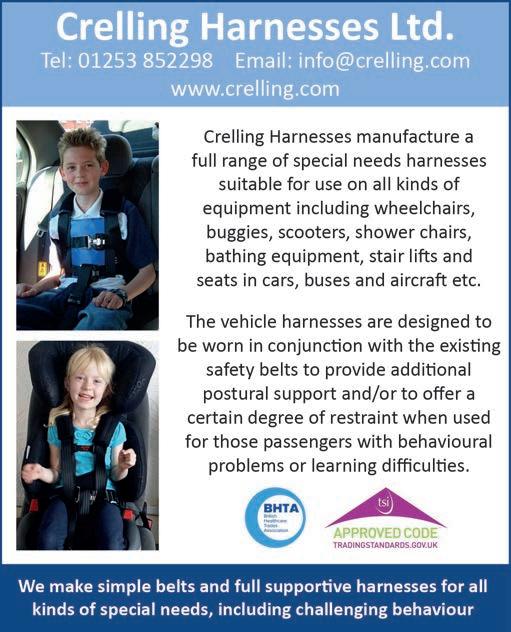
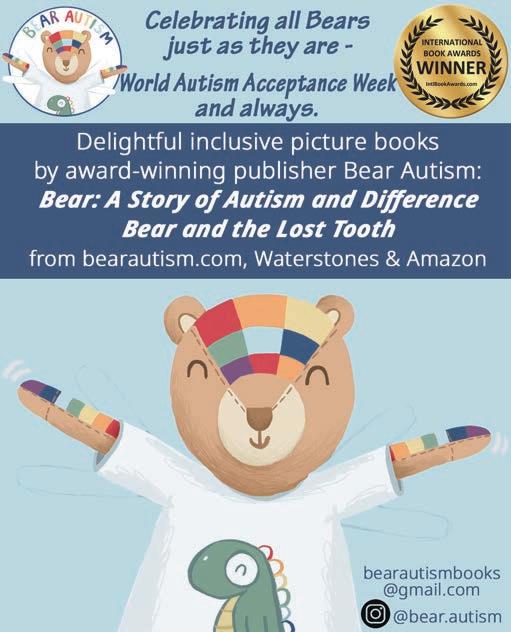






Be a half marathon hero with Team Autism!
Great North Run – 8 September 2024

Royal Parks – 13 October 2024


Join Team Autism on the streets through Newcastle to South Shields on this atmospheric, fun-filled half marathon.




Take part in the greenest half marathon London has to offer, taking you through the magnificent gardens of four Royal Parks.
“I enjoyed every aspect of the race and support from the National Autistic Society.” 2022 runner
Secure your spot on the start line and help us race towards a brighter future for autistic people: autism.org.uk/fundraising-events

The National Autistic Societyis acharity registeredinEngland and Wales(269425) andinScotland(SC039427)







Scanthe QR code for further details
How to… help your child awaiting diagnosis
Laurie Morrison, an Educational Psychologist working alongside The Pines Highland Neurodevelopmental Service, introduces the Neurodevelopmental Profile Wheel, which supports planning for your child’s individual needs while awaiting an autism assessment and beyond
As parents and professionals, we strive to identify the most appropriate way of supporting each child. Every child is unique and has their own profile of strengths, pressures and distinct needs.
Aspects of the individual profile of needs may meet the diagnostic criteria for a specific neurodevelopmental condition, such as autism. However, the profile of needs for many children and young people may not be consistent with any diagnosis or, alternatively, with multiple co-existing diagnoses.
While diagnostic labels can be helpful in framing our thinking and understanding around individuals, there can be lengthy waits to receive appropriate assessment and diagnosis, and these may not provide the individualised information we need to support the young person best.
Given these pressures, The Pines Highland Neurodevelopmental Service was keen to take a more holistic approach to supporting children and young people. We created training that considers the development of children and young people across six areas – social, communication, cognitive, sensory, motor and emotional − to improve understanding of neurodevelopmental differences.
We also developed a Neurodevelopmental Profile Wheel, which supports parents and professionals to work collaboratively to understand the individual needs of a particular child or young person, and to create a shared
Your Autism
plan for support. The neurodevelopmental training and Profile Wheel follow a similar format, based around:
● Presentation – how does the child present in different settings? What are we seeing?
● Profile – why might we be seeing this presentation? What does it tell us about their development?
● Plan – what already works, and what else might help?
The Neurodevelopmental Profile Wheel provides a useful structure to consider these areas. It encourages us to think about any background information we already have that may impact the child’s development and presentation. This may include significant events or previous events, previous assessments or diagnoses.
When considering the child’s presentation, we are keen to highlight what is going well, in addition to factors that may be a challenge. The profile section considers each area of development in turn and is an opportunity to analyse the information within the presentation section. For each area of development, prompt questions are used to support analysis and deepen discussions around the child’s strengths and needs. It is worth noting that one presenting ‘behaviour’ may be explained in different ways. For example, a child being slow to start a task may be explained by a difference in relation to communication, sensory, cognitive or emotional development.
Advice
32
< The Profile Wheel, which supports parents and professionals to understand the individual needs of a child or young person and create a support plan
Social Sensory Motor
Parent of 13-year-old diagnosed as autistic at age eight EmotionalCognitive Communication
When completed collaboratively, the profile section can lead to a shared understanding of the child and what they might need to thrive across different settings. Initial completion of the Profile Wheel can help to collate what we already know about the child but can also highlight gaps in our understanding.
The final section of the Profile Wheel supports planning. It provides an opportunity to consider what has already been tried and how successful this has been. Key information from the profile section can then be used to identify areas for intervention and support, thinking about the environment, interactions and activities. We might also identify what further information we need. This section is also a chance to consider what other people or agencies can do to support the child and who can support you as a parent or professional to implement changes. The Neurodevelopmental Profile Wheel is often shared with those undertaking formal diagnostic assessment.
“It’s only now, having watched the videos [on the Neurodevelopmental Profile Wheel] and completed the paperwork… that I can truly start to understand the world from her perspective. Having this new level of understanding has enabled us to make significant progress and I now have a happier and healthier child as a result.”
The neurodevelopmental training and Profile Wheel have been used by parents and professionals in Highland in a range of ways since 2021. Feedback has been positive, and, as a team, we have found the tool effective in supporting parents and professionals to meet children’s needs in a more holistic and individualised way.
It can be a powerful means of bringing the team around a child to a shared understanding of the child’s needs. Most importantly, it informs planning to ensure needs are better met. You can access further information on using the Neurodevelopmental Profile Wheel by visiting thepineshighland.com/ neurodevelopmental-profile-wheel
Spring 2024 33 Advice
Appealing to an education tribunal
Liesel Batterham, Autism Help Advisor at our charity, explains how you can prepare for a tribunal appeal about your child’s special educational needs
What is an education tribunal appeal?
If you disagree with a decision made by your local or education authority relating to your child’s additional support or special educational needs, you can appeal to an education tribunal. The tribunal is a free, impartial and independent panel comprising a judge or convener and one or two specialist members. Appealing to the tribunal is different from making a complaint to your local or education authority, and you will only have the right to appeal to the tribunal in certain circumstances.
Each nation within the UK has different tribunal bodies that hear education appeals:
England: First-tier Tribunal (Special Educational Needs and Disability) –www.gov.uk/courts-tribunals/ first-tier-tribunal-specialeducational-needs-and-disability
Northern Ireland: Special Educational Needs and Disability Tribunal – www.justice-ni.gov.uk/ articles/special-educationalneeds-and-disability-tribunal-0
Scotland: Additional Support Needs Tribunal for Scotland and Education Appeal Committee –healthandeducationchamber.scot
Wales: Educational Tribunal for Wales (ETW) or Special Educational Needs Tribunal Wales (SENTW) –specialeducationalneedstribunal. gov.wales
What decisions can I appeal?
England: You can appeal decisions related to education, health and care (EHC) assessments and education, health and care (EHC) plans.
Northern Ireland: You can appeal decisions related to statutory assessments and statements of special educational needs (SEN).
Scotland: You can appeal to the tribunal in relation to Co-ordinated Support Plans (CSPs), placing requests (special schools/child has CSP), Post-School Transitions, Capacity and Wellbeing. The Education Appeal Committee hears exclusions and placing request appeals for mainstream schools (where a child does not have a CSP).
Wales: You can appeal to SENTW

in relation to decisions about statements of SEN and to ETW in relation to decisions about assessment of additional learning needs and individual development plans (IDPs).
When can I appeal?
You have the right of appeal when your local or education authority sends you its decision in writing. It must tell you how to appeal and the deadline for lodging the appeal. There is no cost involved in lodging an appeal, and you can claim for certain expenses, such as the cost of travel to the hearing venue. If you live in England, you may also need to contact your local mediation service. Details will be in the letter
Advice 34
Your Autism
iStock.com/ sturti

from your local authority. In other nations, you can choose whether or not to take part in mediation or, in Northern Ireland, the Dispute Avoidance and Resolution Service.
How can I prepare for an appeal?
The role of the tribunal (or, in Scotland, the tribunal or Education Appeal Committee) is to hear appeals against decisions made by local/education authorities concerning a child or young person’s additional support or special educational needs. The tribunal will make a direction for action based on the evidence presented to them.
The tribunal tries to ensure that the process of appealing is as
user-friendly as possible and to avoid hearings that are overly legalistic or technical. The aim is to avoid the need for you to seek legal representation when appealing a decision, although you may find it helpful to have support from a voluntary organisation or friend at a hearing.
The tribunal’s decisions are based on education law, statutory regulations and guidance, and case law, so it’s helpful if you have some understanding of the education law relating to your situation. For example, if your authority has refused to undertake an assessment of your child’s needs, you need to know what the legal threshold is for an assessment to be considered. All
Further sources of help
Read our advice on resolving differences in education at autism. org.uk/resolving-differences These organisations can offer further advice:
UK-wide
● Contact is a registered charity for families with disabled children – contact.org.uk
England
● Independent Provider of Special Education Advice (IPSEA) is a registered charity that offers free and independent information, advice and support to parents in England – ipsea.org.uk
Northern Ireland
● The Special Educational Needs Advice Centre advises on the Northern Ireland statutory SEN system – senac.co.uk
Scotland
● Enquire provides advice about additional support for learning for children attending school enquire.org.uk
● Govan Law Centre’s Education Law Unit provides legal advice on the rights of pupils with additional support needs –govanlawcentre.org/ education-law-unit
Wales
● SNAP Cymru provides advice on a variety of issues that a child or young person may encounter during their education –snapcymru.org/get-support >
Spring 2024 35 Advice
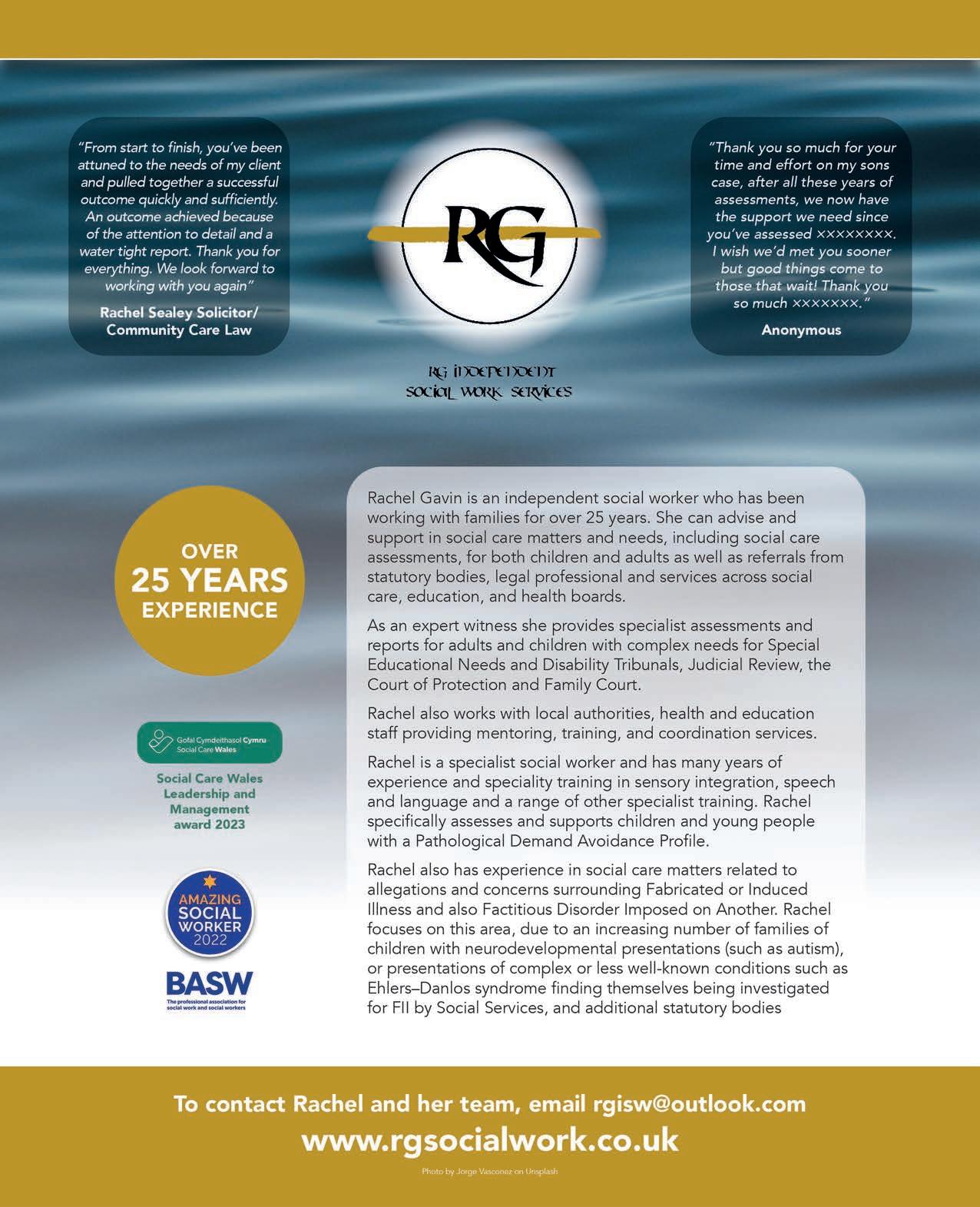

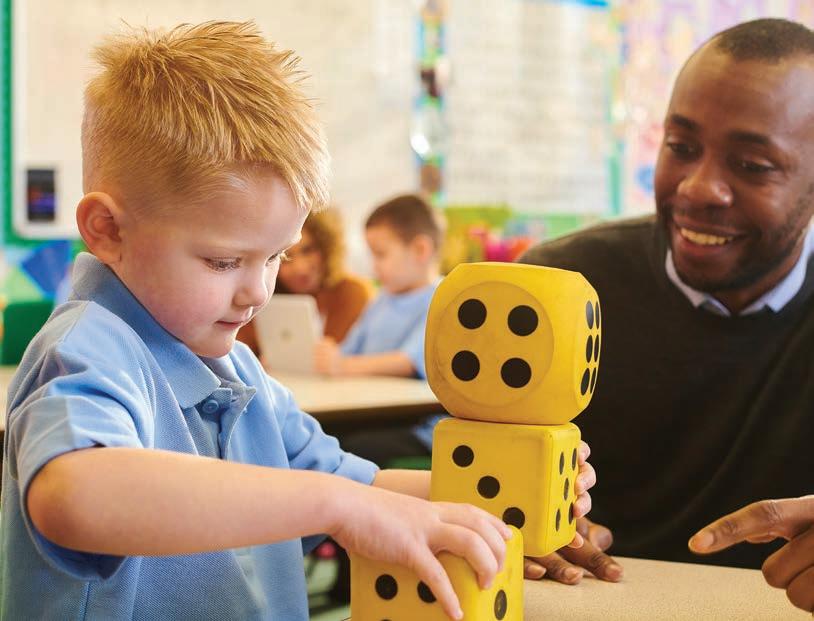
“It’s natural that you will be emotionally invested in the outcome, but the panel will be looking for facts”
nations have codes of practice that offer guidance to the law, and these codes are used by the tribunal. There are also helplines available that can offer advice.
The tribunal’s decision will consider written and spoken evidence. You need to be clear about what outcome you want to achieve, but also realistic. Although the tribunal panel’s primary concern is what would best meet your child’s needs (within the statutory framework), they will take financial considerations into account when making their decision.
When preparing for an appeal, it is important to become familiar with the law relating to your situation and the content of the professional reports that you have about your
child. In particular, you need to pick out and use information and advice from professional reports that supports your own views. If reports give advice that you disagree with, you should try to offer counterevidence if possible, either from your own vast experience and knowledge of your child or from other reports you may have.
It’s helpful if you write a list of things you want to raise at the tribunal hearing and to link and cross-reference your points to sections within professional reports that you have. For example, if your child needs additional time to process information, you could point out that this advice is included in the educational psychologist’s report on page six.
Having a list or written document setting out the information and evidence you want the tribunal to consider will help you to keep your case factual. This can be very difficult; it’s natural that you will be emotionally invested in the outcome for your child, but the panel will be looking for facts and evidence.
It’s vital that you are aware of the set deadlines that you need to meet within the appeal process and ensure that you meet these. Early preparation is important. Start to gather your thoughts and evidence as early as possible within the process. The more time you give yourself for research and preparation, the better. It can be daunting, but delaying will only make it more stressful.
The tribunal panel will look at the information that you and your authority provide to decide how to settle the disagreement. They aim to be accessible to unrepresented parents and young people. It is also important to know that the outcome of a tribunal hearing is always uncertain.
Top tips
You will need to:
● have some understanding of education law and how it applies in your situation
● focus your efforts on what is needed to prove to the panel to win your case. Evidence is crucial
● consider the authority’s response to the appeal and its evidence carefully – plan how it will present its different views
● be well organised and plan for deadlines
● keep communications clear and factual, using everyday language. Keep copies of everything.
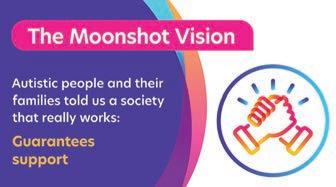
Advice Spring 2024 37 iStock.com/ sturti

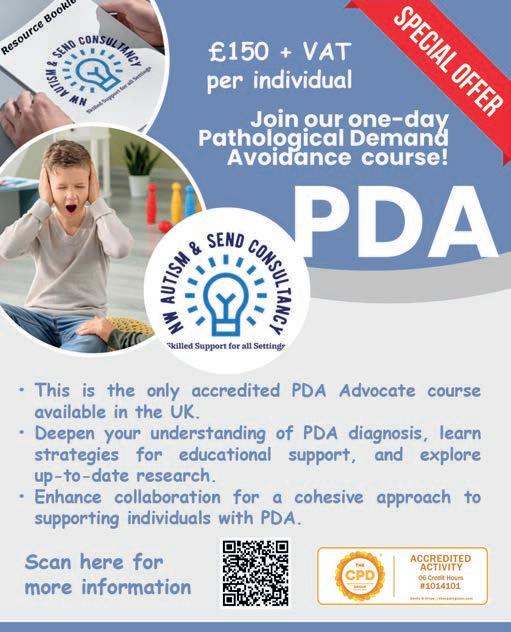

Did you know you can remember the National Autistic Society with a gift in your will? For





legacyteam@nas.org.uk 0808 8001050
a free information booklet, please email or ca
Notebook
Everything you need to read, do or see
Finding Phoebe
AUTHOR: Gavin Extence
PUBLISHER: Andersen Digital
PRICE: £7.85 (ebook £2.49)
VERDICT: An in-depth, relatable exploration of growing up as an autistic teenager
Set in the north east of England, Finding Phoebe is a tale of friendship, secrecy and unexpected challenges. The story is told from the perspective of Phoebe, a 16-year-old autistic girl with a family mystery to uncover and a best friend leading a double life. The book also explores sensitive topics such as puberty, grief, religion and sexuality. These are covered in a matter-of-fact, easy-to-read manner, alongside the additional challenges of facing these issues as an autistic teenage girl.
Grace Liu, Direct Marketing Officer at the National Autistic Society
Gavin Extence explains the inspiration behind the book
“I wrote this book for my daughter. Amelia was diagnosed as autistic, aged four. After some discussion, my wife and I decided we wanted to talk to her about it sooner rather than later. We wanted her to grow up knowing that she was neurodivergent, and this was just one thing among many that made her a unique human being. So, we wrote her a letter. Our aim was to explain to her why she experienced the world a little differently from some other people; why she found some things very easy and some things very hard; why she could read fluently but found some social games impossible to fathom. I suppose, like most parents, we just wanted to give our daughter the best tools we could to help her understand herself and the world around her. And we wanted to tell her, at the earliest opportunity, that it’s okay to be different – and often it’s more than okay – and that as much as our differences can present us with challenges, they can also,
sometimes, be the source of our greatest strengths. In a sense, this novel is a continuation of the same project. Amelia is ten now, but I know she’ll be a teenager in the blink of an eye. Being a teenager is tough for anyone, but it can be particularly tough for autistic girls. It’s the time when social dynamics change, when hormones kick in, when relationships with friends become more complicated – when life, in general, becomes more complicated. In short, it’s messy, and this book is about two girls – one neurotypical, one not – trying to navigate that mess. It’s about love and friendship, selfacceptance and the acceptance of others. My original hope was that it might help my daughter to negotiate the weird, knotty and sometimes frightening transition from childhood to adulthood, but I hope it will prove equally helpful to others.”

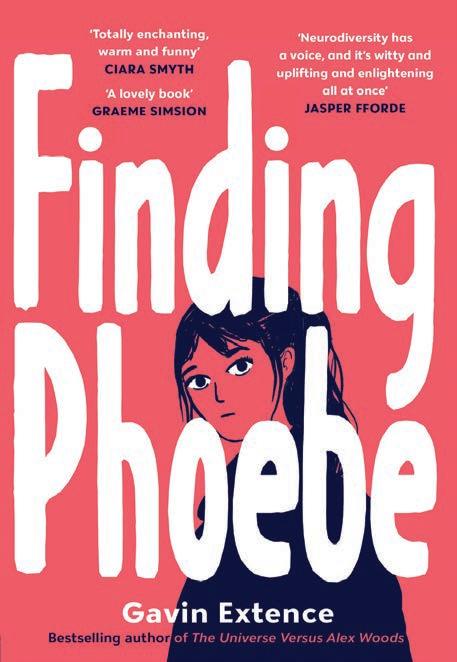
Spring 2024 39
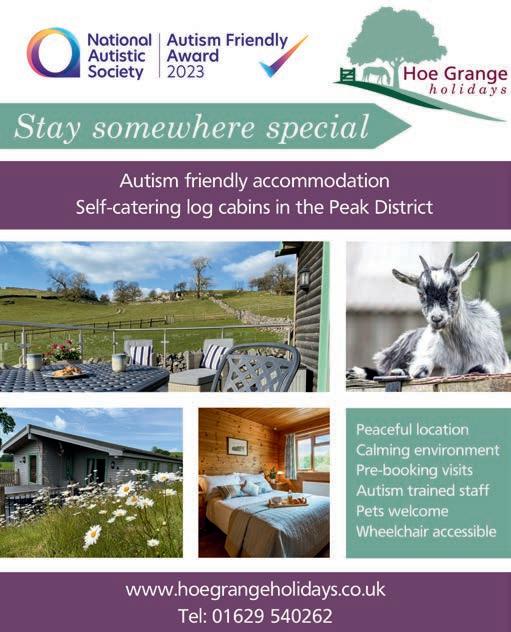
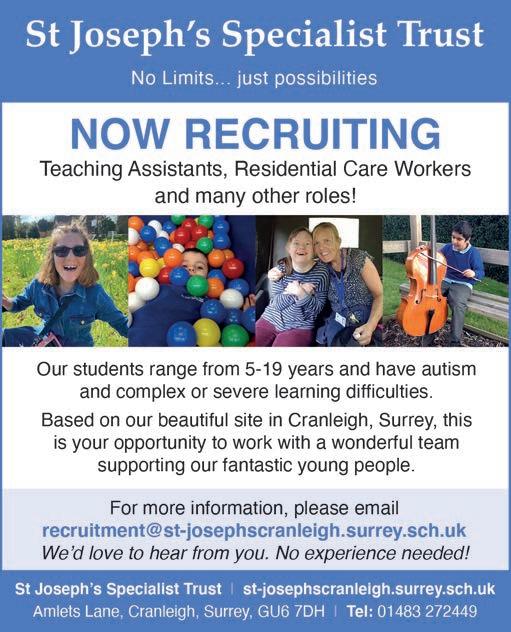
Get your trekking boots on and take up the challenge with Team Autism!
Yorkshire Three Peaks - 8 or 9 June 2024
Choose your date to climb the famous Yorkshire Three Peaks on this exciting and challenging trek. You’ll accomplish an ascent of 1,532m and cover a marathon distance in just a single day.
Jurassic Coast - 6 or 7 July 2024
Starting from the coastal town of Swanage for the 30km walk or St Aldhelms Head for the 20km walk, you’ll trek along the beautiful Jurassic Coast, a famous World Heritage Site on the south coast.
Scafell Pike - 10 or 11 August 2024
Join us on an epic adventure in the Lake District, where you will trek the highest mountain in the UK. Reach a summit that, on a good day, boasts views of Wales, Scotland, the Isle of Man and Ireland in one spectacular vista.
Book your place on Team Autism now: autism.org.uk/fundraising-events
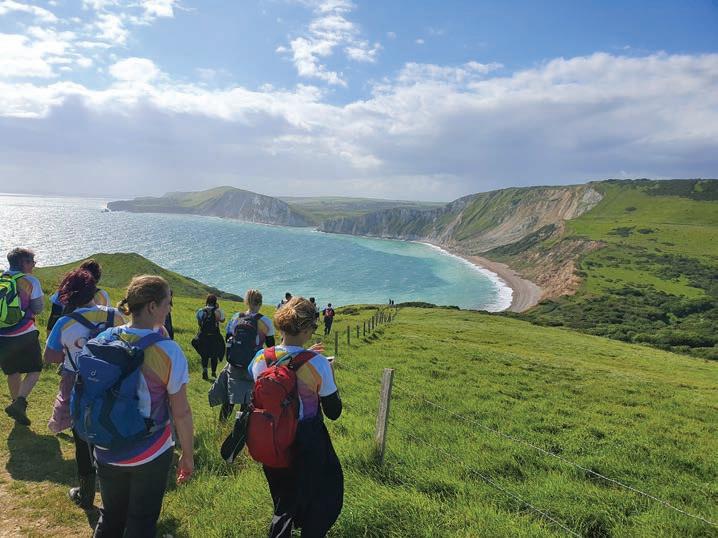 Scanthe QR code for further details
The National Autistic Societyis acharity registeredinEngland andWales (269425) andinScotland(SC039427)
Scanthe QR code for further details
The National Autistic Societyis acharity registeredinEngland andWales (269425) andinScotland(SC039427)
Notes for neuro navigators:
The allies’ quick-start guide to championing neurodivergent brains
AUTHOR: Jolene Stockman
PUBLISHER: Jessica Kingsley Publishers
PRICE: £9.99 (ebook £5.99)
VERDICT: Down-to-earth guide to support autistic people
In a world built for neurotypicals, how can you help autistic loved ones? In this straight-talking guide, autistic author Jolene Stockman covers strategies to build a sense of safety and ideas for sensory recovery. This practical book will help you find out and meet the needs of the autistic people in your life.
Suzanne Westbury, Editor of Your Autism
Giveaway
We have a copy of Notes for neuro navigators to give away to a member. For a chance to win, please email your name and address to YourAutismMag@ nas.org.uk by 20 May 2024, putting “Notes” in the subject line. The winners of last edition’s giveaway for a copy of Normal schmormal: My occasionally helpful guide to parenting kids with special needs are Isabel Hill and John Murphy. The winners of The autistic teen’s avoidant eating workbook are Rebecca Davies and Jaci Roche. Congratulations!
Football, autism and me YouTube bit.ly/Alex-Manners
VERDICT: A useful tool for people who don’t know much about autism, with glimpses into how important and helpful a fixation is for life and mental wellbeing
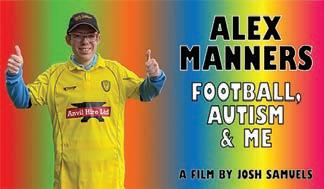
The life of presenter Alex Manners is put into documentary form by his friend Josh Samuels. This 20-minute film functions as an introduction to autism, looking into Alex’s life growing up on the spectrum, how he sees his autism and his relationship with football. It compares the ways Alex enjoys the sport with neurotypical people, giving you a glimpse into how the joy his interest has brought has helped him through life. You get to see the goals (no pun intended) and achievements he’s made for himself, thanks to the love of football that has helped him lead an independent and fulfilling life. Wesley Emmott, Your Autism magazine reader wesleyemmott.co.uk

New! Autism-approved products
Our charity now has a panel of autistic people and their families testing products, and we’re very pleased to bring you their latest recommendations here. The first product to be awarded autism-approval is:
Kinetic Sand
Spin Master
Our tester said: “I really liked the bright colour and found it calming. It held my attention, sprinkling it over my hands and through my fingers.” A parent tester added: “He particularly liked the feel, that it was like ‘real sand’ but didn’t leave sand all over his hands.” Visit kineticsand.com


Spring 2024 41 Notebook
We’re… sports podcasters


Autistic pupils at Tettenhall Wood School in Wolverhampton are celebrating 100 episodes of their sports podcast. Adam Millichip, Special Needs Teacher, tells us more
Tettenhall Wood is a school for autistic pupils. We started the TWS Sports Podcast in 2021 and have spoken to some amazing people, such as Harry Redknapp, Sam Allardyce, Joe Hart, Clive Woodward, Lewis Moody, Nasser Hussain, Steve Davis, Tanni Grey-Thompson and Paddy McGuinness.
Our aim was to develop pupils’ communication and social skills. We thought it would stay small, with a few guests, and stop after a few weeks. Three years later, we’re going stronger than ever, and last December, we released our 100th episode!
In 2021, we won a GLOBAL award at the Sports Podcast Awards. The public voted for us to win the ‘Best Equality and Social Impact’ Sports Podcast, beating off some huge podcasts from around the world. We came runner-up in the same award in 2023, only losing out to a BBC cricket podcast.
We’re so proud to be a small special school that has created a podcast heard around the world, attracting some of the biggest names in sport. You can listen to the podcast at twssportspodcast.co.uk
42 Your Autism
Snapshot

Meet Alyssa
The best part of podcasting?

Having the opportunity to express myself. I love chatting to guests and hearing their stories. It also gives me the chance to share my autism story with the guest and listeners.
What’s challenging?
At the start, I found it difficult to maintain a conversation and have confidence in what I was saying. Now, I just go with the flow and am much more confident going off-script.
Favourite interviewee?
Tanni Grey-Thompson was such an inspiration. Or the Wrexham manager Phil Parkinson, as we got to go to the Racecourse Ground, and he was so good with us.
Advice to potential podcasters
Just do it! I was a little unsure, but I am much more confident in myself now. It’s changed my life and made me a happier person.
Meet Jacob
The best part of podcasting?
Doing the in-person podcasts and going to see our guests at great places like the Anfield and Molineux stadiums.
What’s challenging?
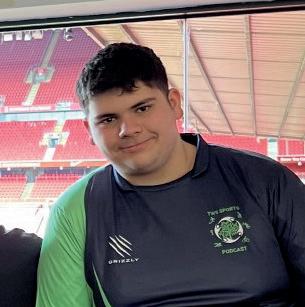
Knowing what to say. Sometimes, I get a bit confused during the conversation, but I’m getting better at that. Adam, our teacher, is there to help us.
Favourite interviewee?
Sammy Lee, who used to play for and manage Liverpool. He told us a story about getting stuck in the overhead storage compartment on an aeroplane, which still makes me laugh!
Advice to potential podcasters
Give it a go. All you need is a microphone and laptop, or your phone. Think about what you would like to talk about and hit record.
Talking on the podcast helps me understand more about myself and autism, and I wouldn’t have done that without the podcast.
Spring 2024 43
TWS Sports Podcast hosts Jacob and Alyssa with Steve Bull and teacher Adam
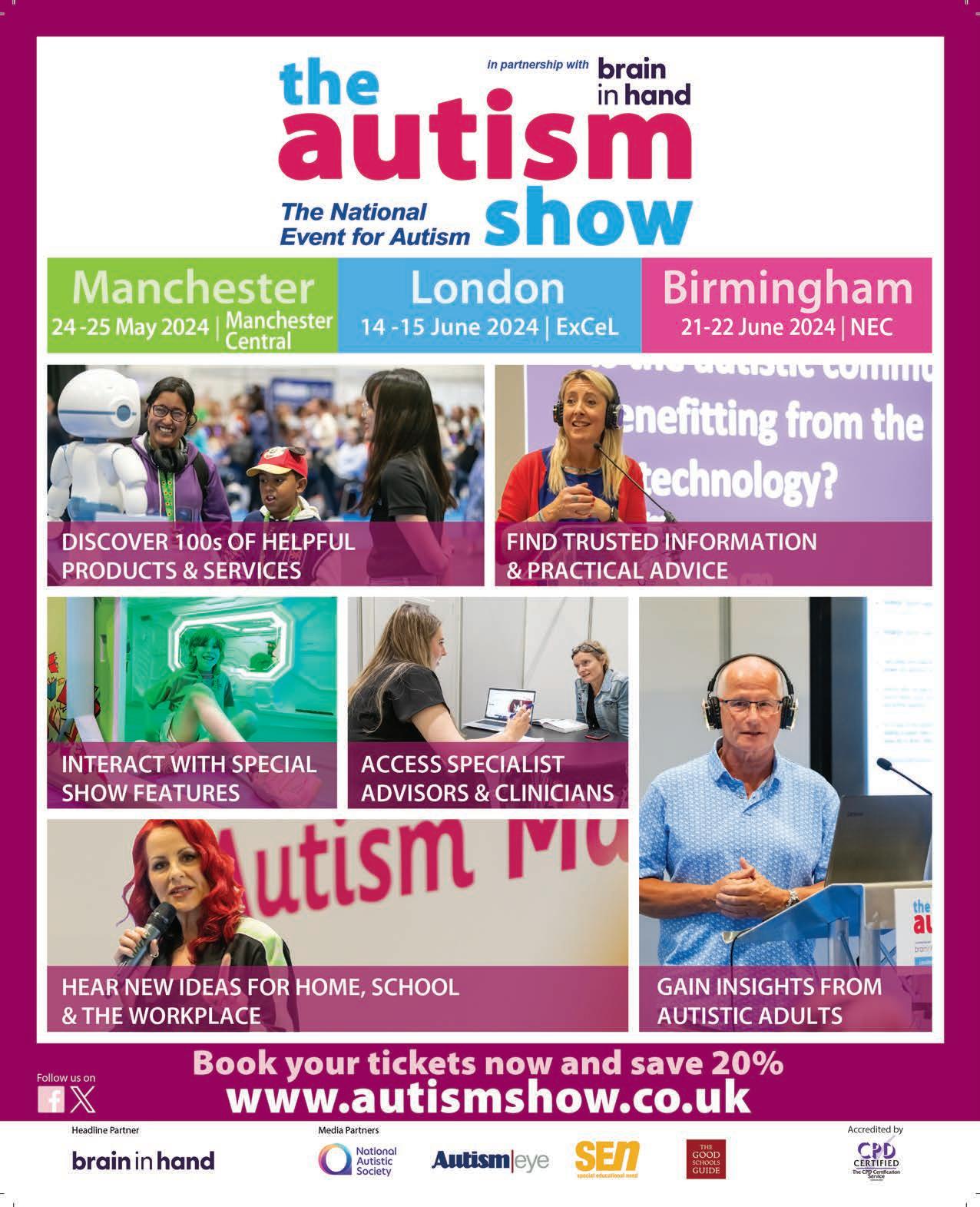








































































































































 Scanthe QR code for further details
The National Autistic Societyis acharity registeredinEngland andWales (269425) andinScotland(SC039427)
Scanthe QR code for further details
The National Autistic Societyis acharity registeredinEngland andWales (269425) andinScotland(SC039427)









